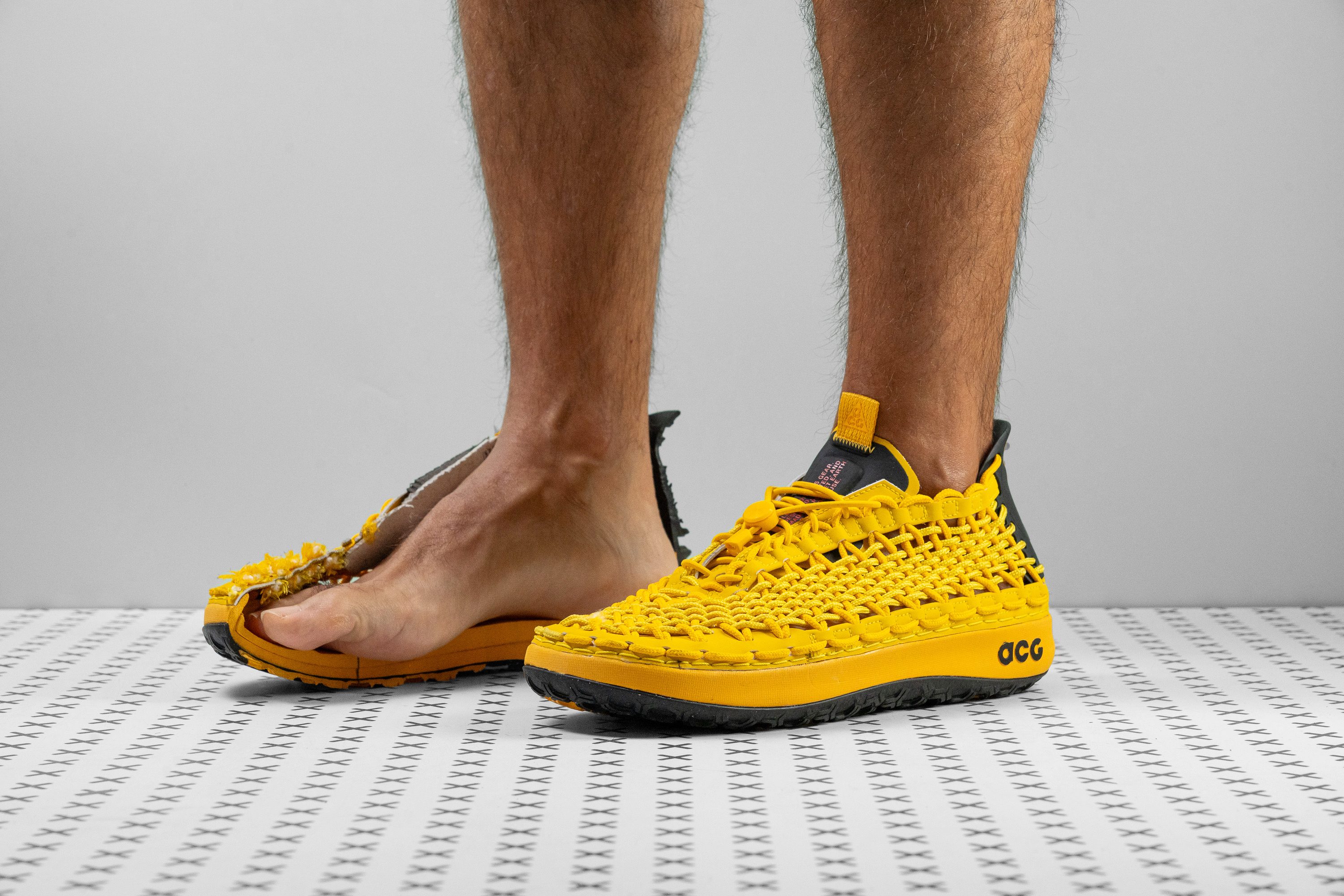Our verdict
- Top pick in best Nike hiking shoes
Pros
- Outstanding water drainage
- Immensely breathable
- Excellent abrasion resistance
- Very light on foot
- Amazingly grippy on wet
- Very grounded platform
- Bends along with the foot
- Adaptable fit with a roomy toebox
- Easy on-and-off
- Comfy in-shoe feel
- Bold aesthetics
Cons
- No arch or ankle support
- Catches debris and small pebbles easily
Audience verdict
- Top 1% in Nike hiking shoes
Comparison
The most similar hiking shoes compared
+ + Add a shoe | |||||
|---|---|---|---|---|---|
| Audience score | 84 Good! | 85 Great! | 84 Good! | 89 Great! | |
| Price | $125 | $170 | $125 | $110 | |
| Trail terrain | Light | Light | Light | Moderate | |
| Shock absorption | Low | High | - | - | |
| Energy return | High | High | - | - | |
| Weight lab Weight brand | 12.7 oz / 359g | 11 oz / 312g | 6.5 oz / 184g 6.5 oz / 185g | 12.7 oz / 361g 8.8 oz / 250g | |
| Lightweight | ✓ | ✓ | ✓ | ✓ | |
| Breathability | Breathable | Moderate | Moderate | Breathable | |
| Use | Light HikingWater hiking | Day HikingLight HikingUrban hiking | Day HikingSpeed HikingLight Hiking | Speed HikingLight HikingBeginners | |
| Orthotic friendly | ✓ | ✓ | ✗ | ✓ | |
| Drop lab | 4.7 mm | 9.1 mm | -0.8 mm | 9.6 mm | |
| Size | True to size | Slightly small | True to size | Slightly small | |
| Midsole softness | Balanced | Firm | Soft | Balanced | |
| Difference in midsole softness in cold | Normal | Normal | Normal | Normal | |
| Torsional rigidity | Flexible | Moderate | Flexible | Stiff | |
| Heel counter stiffness | Flexible | Flexible | Flexible | Flexible | |
| Stiffness | Flexible | Moderate | Flexible | Moderate | |
| Outsole hardness | Average | Average | Very soft | Average | |
| Material | - | Mesh | - | - | |
| Season | SummerAll seasons | All seasons | All seasons | SummerAll seasons | |
| Toebox durability | Very good | Decent | Good | Decent | |
| Heel padding durability | Good | Bad | Good | Bad | |
| Outsole durability | Good | Good | Decent | Bad | |
| Width / fit | Wide | Medium | Medium | Medium | |
| Toebox width | Wide | Wide | Wide | Medium | |
| Lug depth | 2.7 mm | 2.5 mm | 2.1 mm | 3.4 mm | |
| Heel stack lab | 22.0 mm | 35.5 mm | 9.9 mm | 30.6 mm | |
| Forefoot | 17.3 mm | 26.4 mm | 10.7 mm | 21.0 mm | |
| Widths available | NormalWide | Normal | Normal | Normal | |
| Technology | - | - | Vibram | - | |
| Heel tab | Pull tab | Finger loop | Finger loop | Finger loop | |
| Removable insole | ✓ | ✓ | ✗ | ✓ | |
| Ranking | #21 Bottom 40% | #18 Bottom 48% | #23 Bottom 34% | #6 Top 18% | |
| Popularity | #30 Bottom 14% | #18 Bottom 48% | #34 Bottom 2% | #28 Bottom 20% |
Who should buy
We believe that the ACG Watercat+ is a true gem if you are in search of the following:
- a comfy water-draining shoe for the beach, water activities, and hiking near water bodies
- a highly breathable, sandal-like shoe for hot summer weather
- a water shoe that's actually sexy (unlike Crocs and Hydro Mocs)
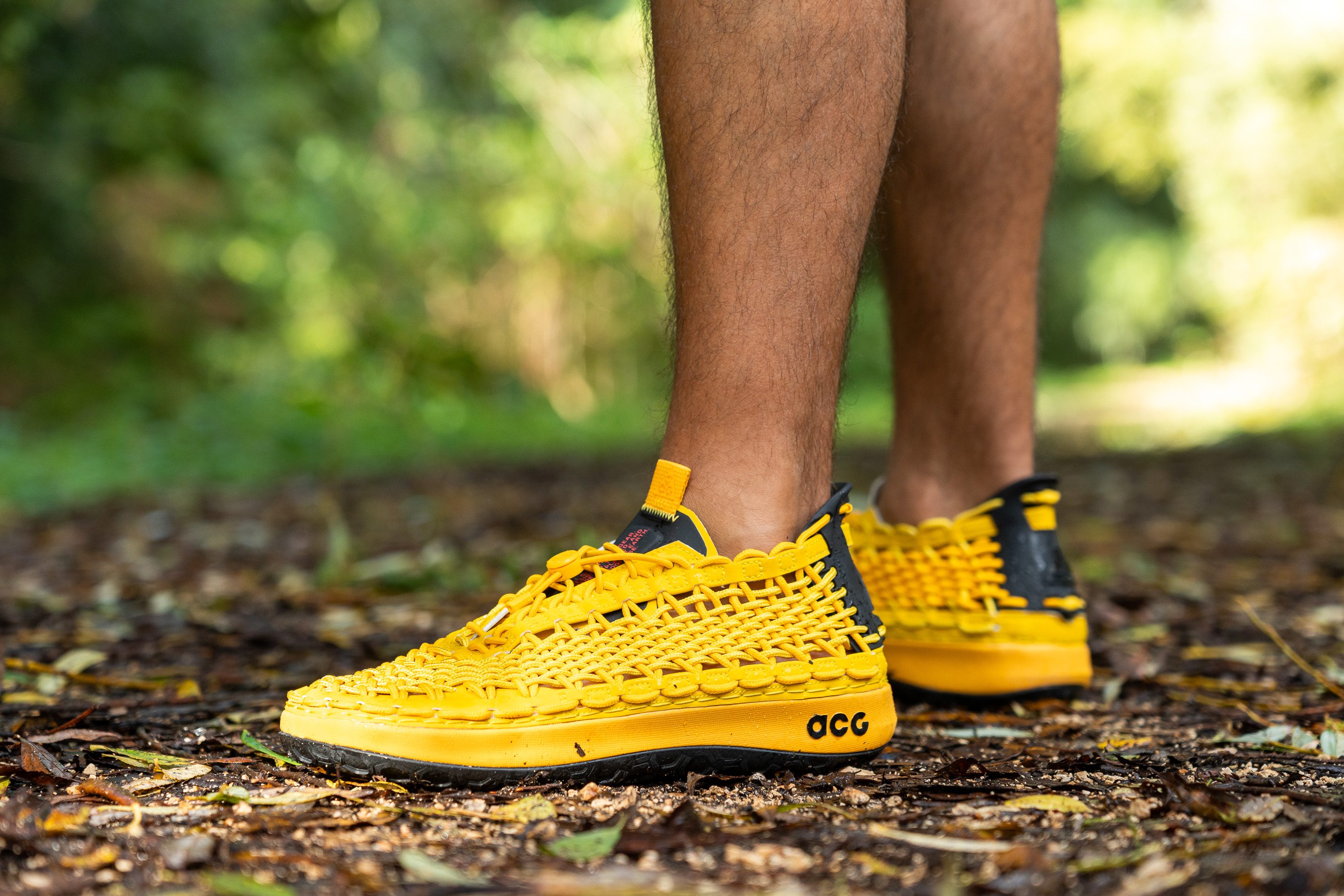
Who should NOT buy
If you have overpronation, flat feet, plantar fasciitis, or any other foot condition that requires supportive footwear, it's better to avoid the Nike ACG Watrcat+. You will find the KEEN Newport H2 to be a more stable and supportive option. But granted, not as pretty.
If you want something that will keep your feet warm, check the Fivefingers V-Trek out.
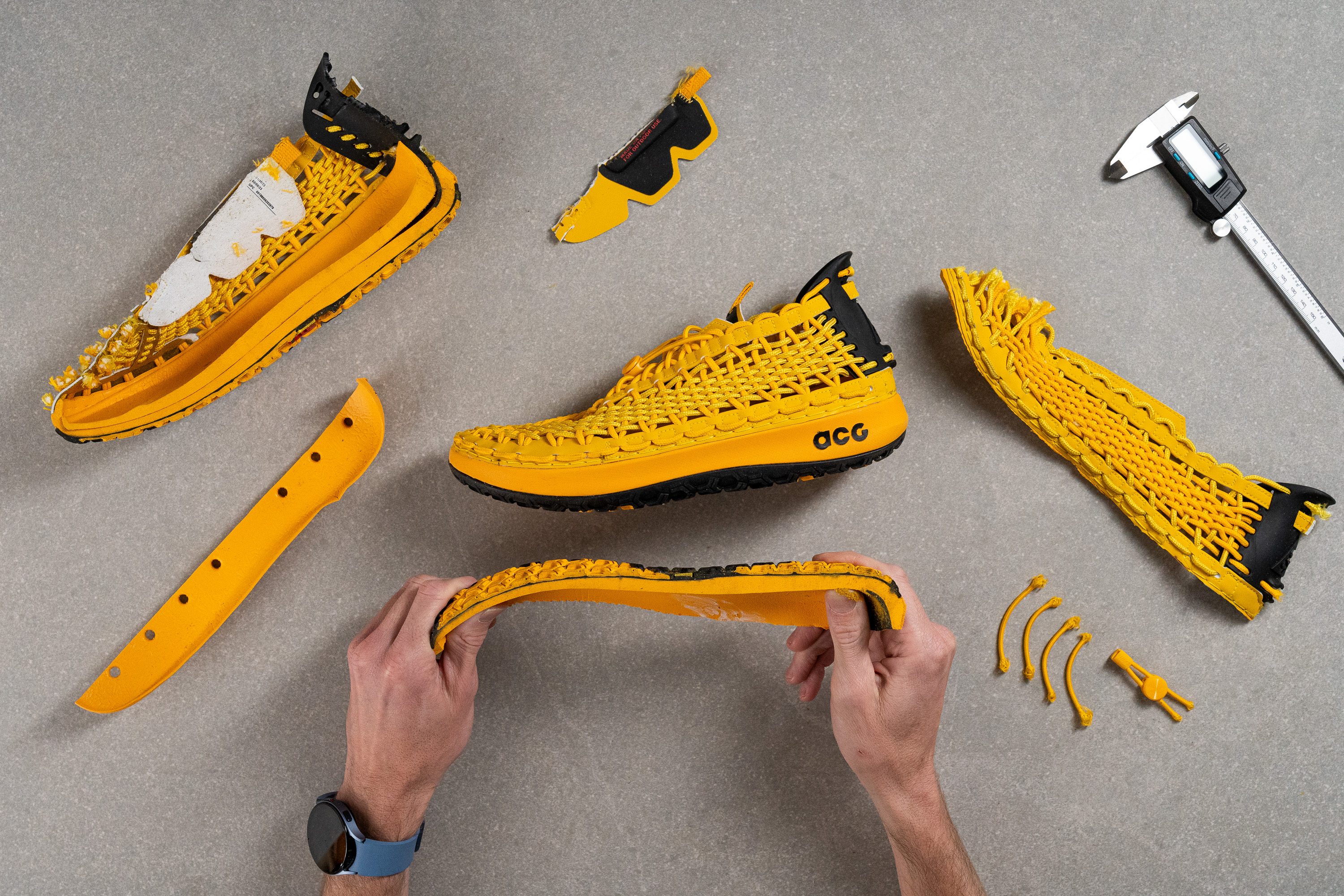
Cushioning
Shock absorption
The ACG Watercat+ is meant for hopping on wet river rocks and enjoying water activities - it is not the shoe for hiking long distances with a heavy backpack. That's why its shock absorption is limited and showed a below-average reading of 98 SA in our test.
Instead, this Nike shoe offers a firm and grounded platform to help you secure your steps on slippery surfaces and rocky river bottoms.
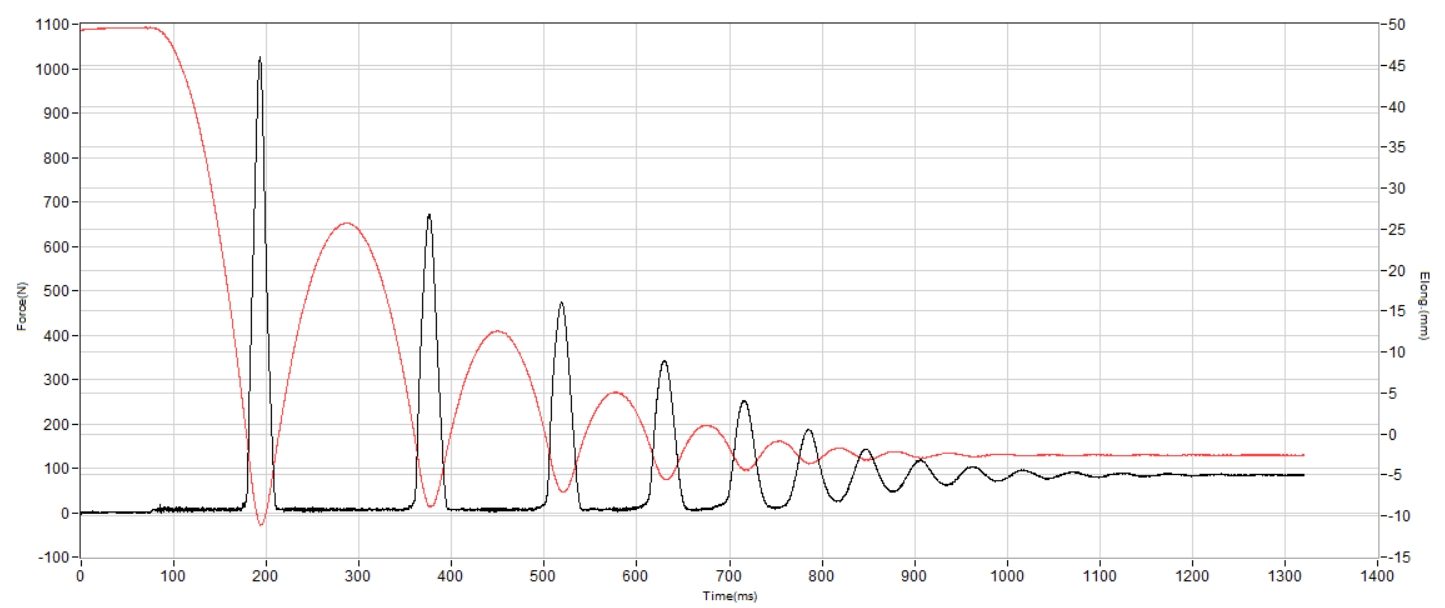
| ACG Watercat+ | 98 SA |
| Average | 104 SA |
Energy return
The Watercat+ also helps you feel more agile with a high energy return of 57%. Its thin sole feels very responsive and lively underfoot.
| ACG Watercat+ | 57.0% |
| Average | 50.2% |
Heel stack
Stepping in and out of the water, navigating uneven rocky shores, or balancing on a paddle board, you certainly prefer ground feel to impact protection. This is the reason why your foot sits closer to the ground inside the Nike ACG Watercat+ compared to regular hiking shoes.
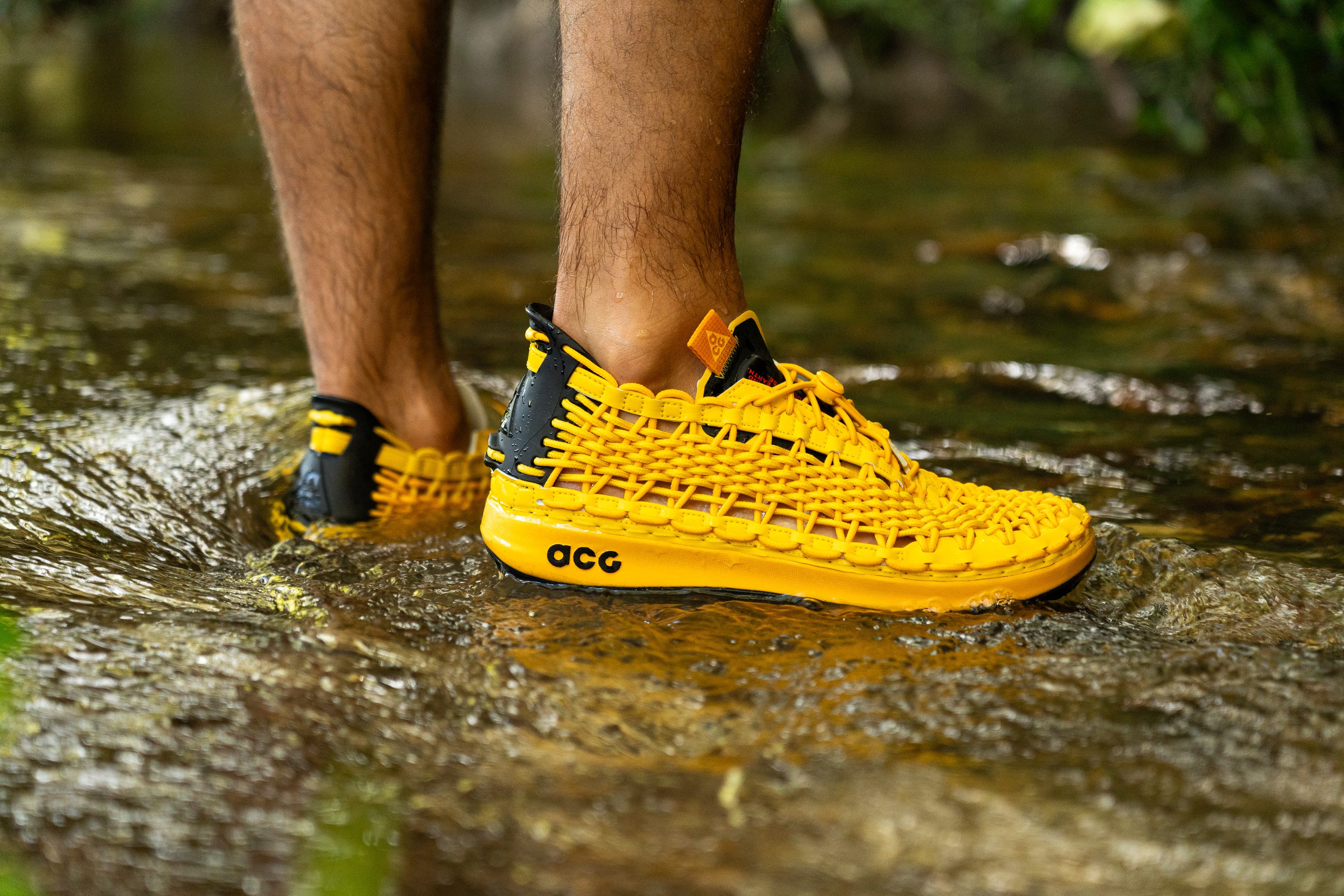
Using a caliper, we measured the shoe's heel stack height at only 22.0 mm. This is not only thinner than the average of hiking shoes, but is even thinner than the average of outdoor sandals!
We found this Nike shoe to be comfortably grounded as it provided good sensitivity while still protecting our feet from pokes and sharp obstacles.
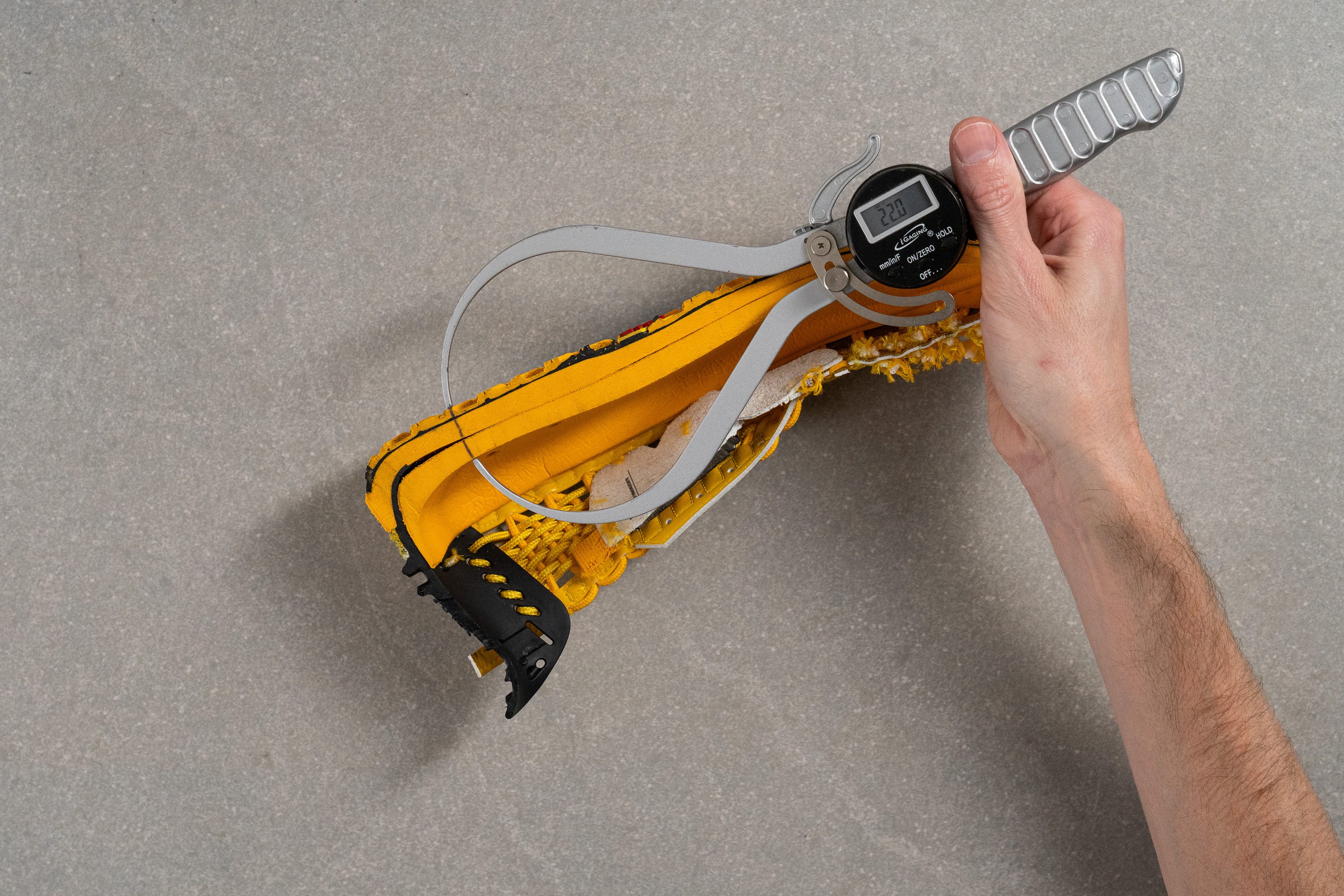
| ACG Watercat+ | 22.0 mm |
| Average | 32.8 mm |
Forefoot stack
As expected, the forefoot stack of the Watercat+ is also pretty minimal. Based on our caliper, it is only 17.3 mm thick which is notably lower than the average.
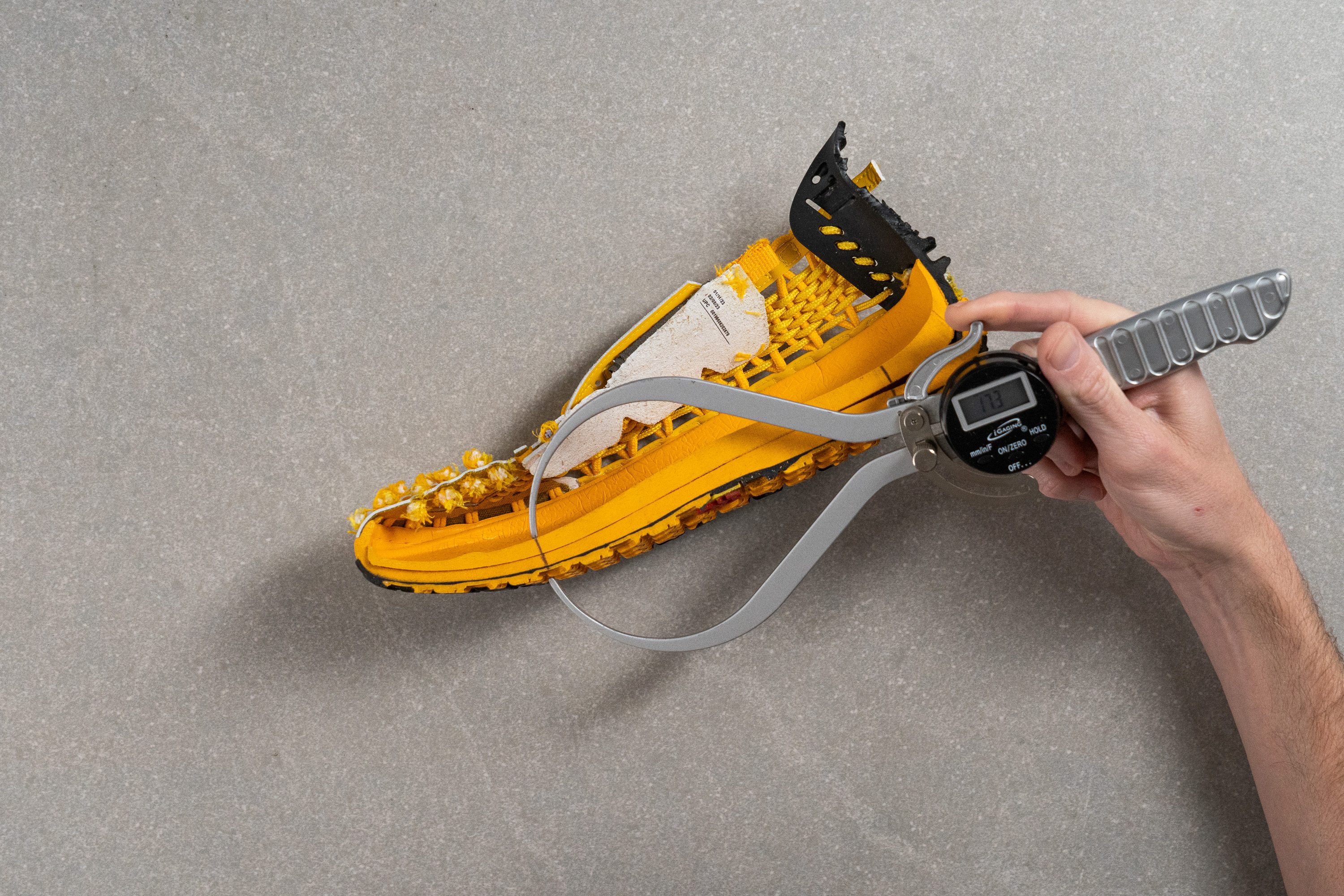
| ACG Watercat+ | 17.3 mm |
| Average | 22.0 mm |
Drop
Checking the difference in stack heights, we got a drop of 4.7 mm in the Nike ACG Watercat+. This means that your heel is only slightly elevated above the toes inside this shoe.
Being twice as low as the average, it is actually a good thing for a water shoe. Having a more level foot positioning, we felt more connected to the ground and our feet were able to work naturally to balance in tricky conditions.
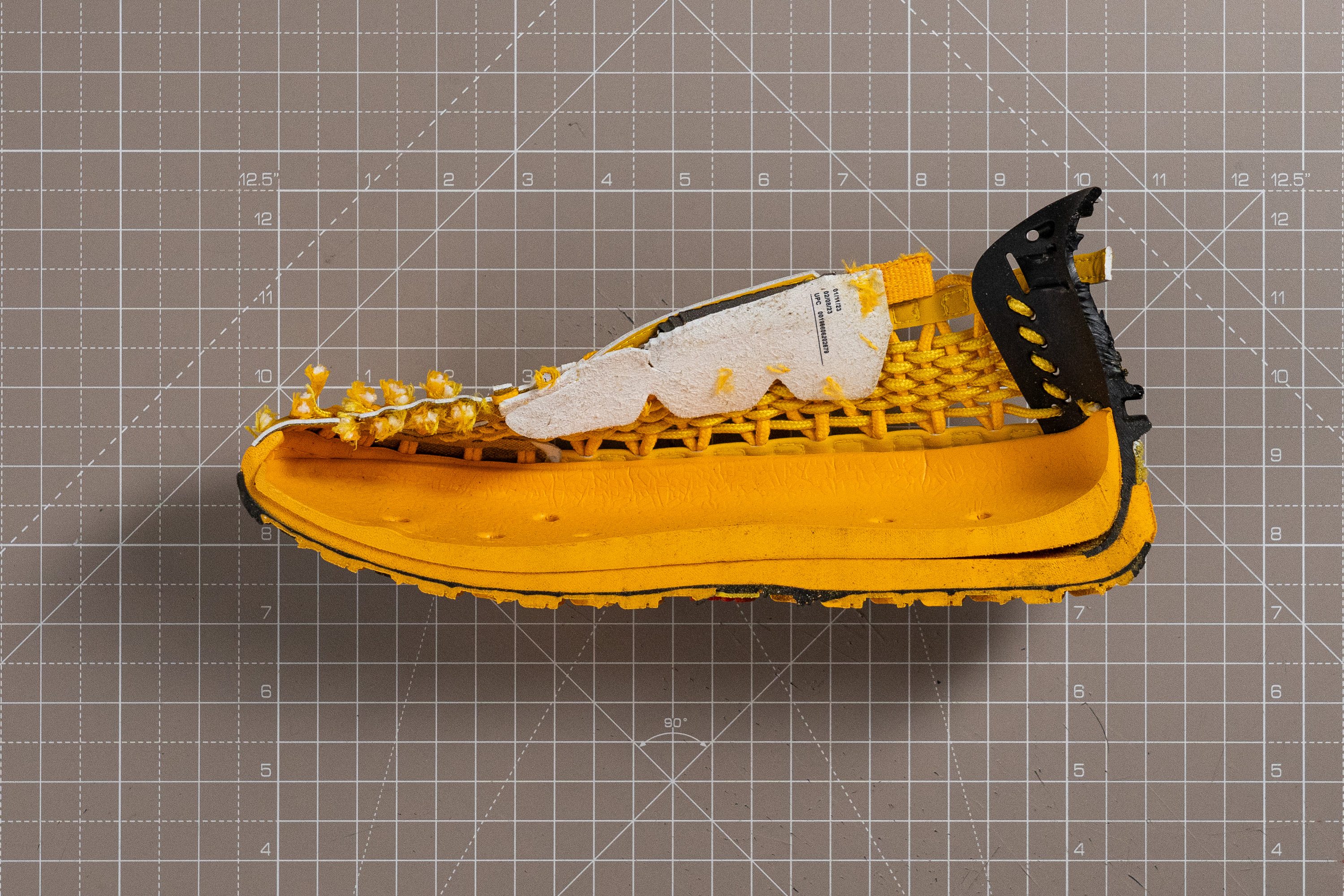
For contrast, here is what a typical hiking shoe drop looks like (10-12 mm). You can see that there is notably more cushioning under the heel here. This setup provides better impact protection and long-term support, especially when you hike with a heavy backpack.
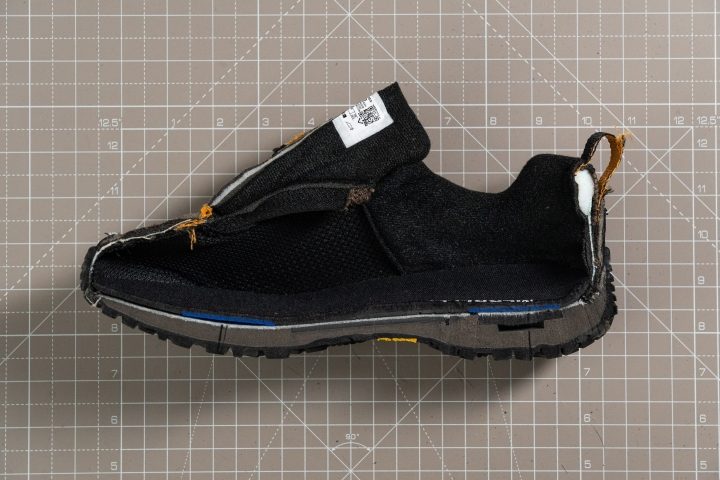
| ACG Watercat+ | 4.7 mm |
| Average | 10.7 mm |
Midsole softness
To let you know exactly how firm this Nike shoe feels, we pressed a durometer against its midsole.
With a reading of 30 HA, it actually sits at the average of hiking shoes we've tested. So don't think of it as rock-hard either.
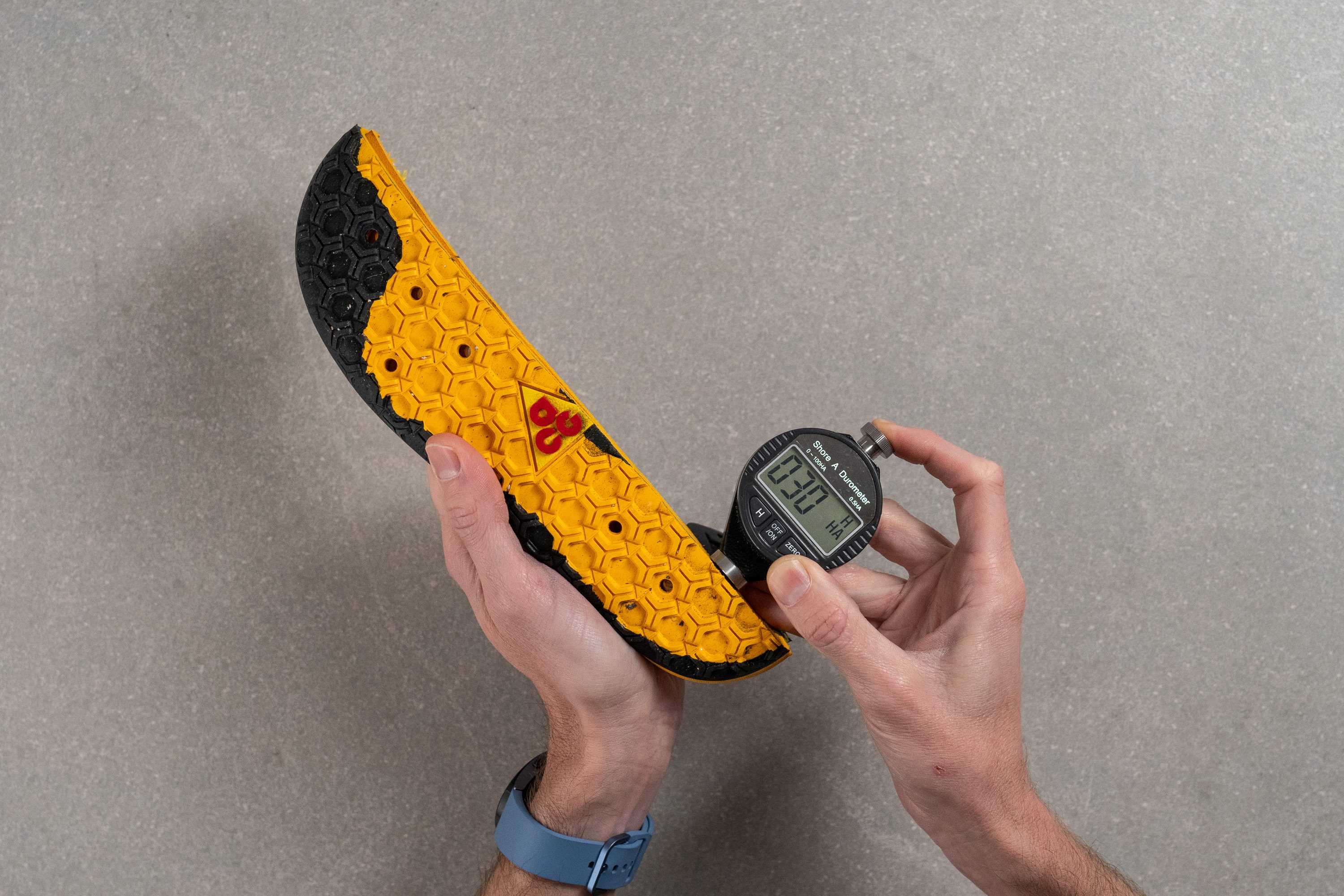
| ACG Watercat+ | 30.0 HA |
| Average | 27.0 HA |
Size and fit
Size
Nike ACG Watercat+ fits true to size (75 votes).
Internal length
| ACG Watercat+ | 255.7 mm |
| Average | 268.7 mm |
Width / Fit
The shoe's unique woven upper stretched and adapted to our foot shape beautifully. And it did so without any blisters or rubbing!
To give you a better insight into the Watercat's fit, we created a mold of the shoe using a proprietary gel and a freezer.
Once the gel cooled off, we measured the widest part of the mold with a caliper. The tool returned an above-average reading of 97.9 mm which qualifies this water shoe even for wide feet! In fact, its bungee lacing and stretchy weaves can accommodate pretty much any foot shape.
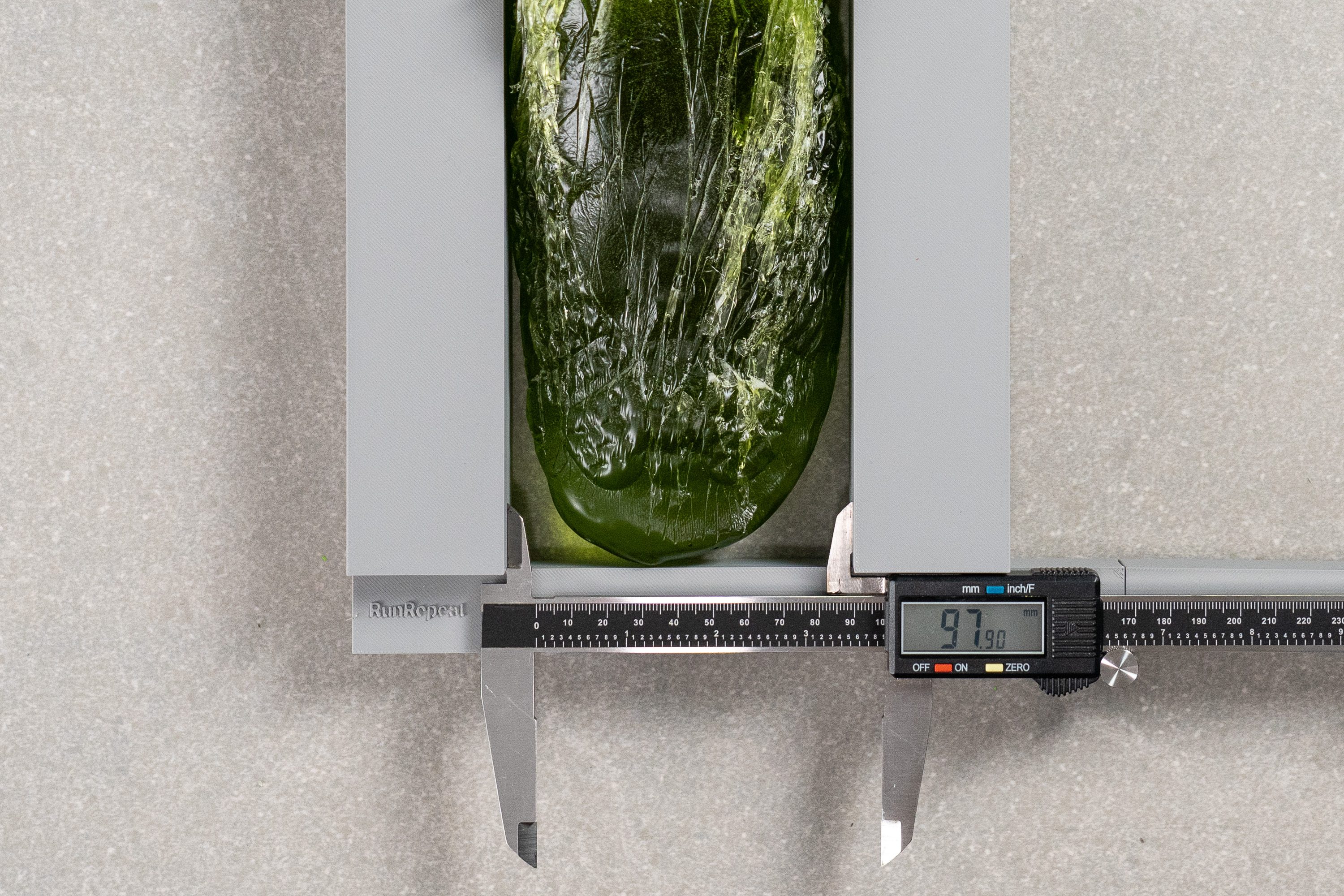
| ACG Watercat+ | 97.9 mm |
| Average | 94.1 mm |
Toebox width
The shoe's toebox also comes with a wide and rounded shape that never put pressure on our toes.
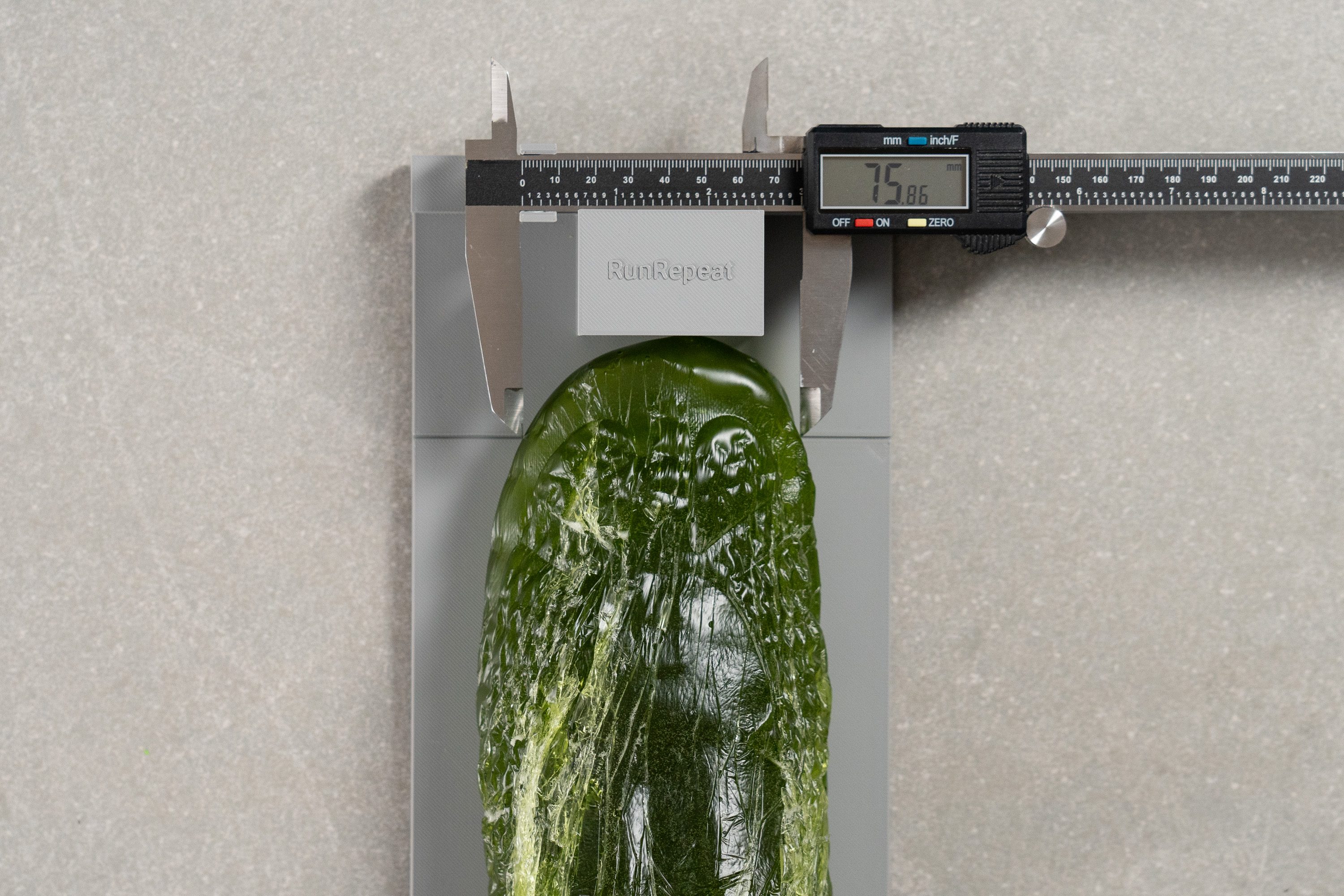
Placing a caliper at the big toe mark, we measured this area at 75.9 mm. Once again, notably wider than average.
| ACG Watercat+ | 75.9 mm |
| Average | 72.5 mm |
Toebox height
Keep in mind, however, that the top of the shoe's toebox sits pretty close to the toes with a vertical measurement of 25.2 mm. But we can't complain about it considering the type of the shoe - you need that one-to-one fit in a water shoe after all.
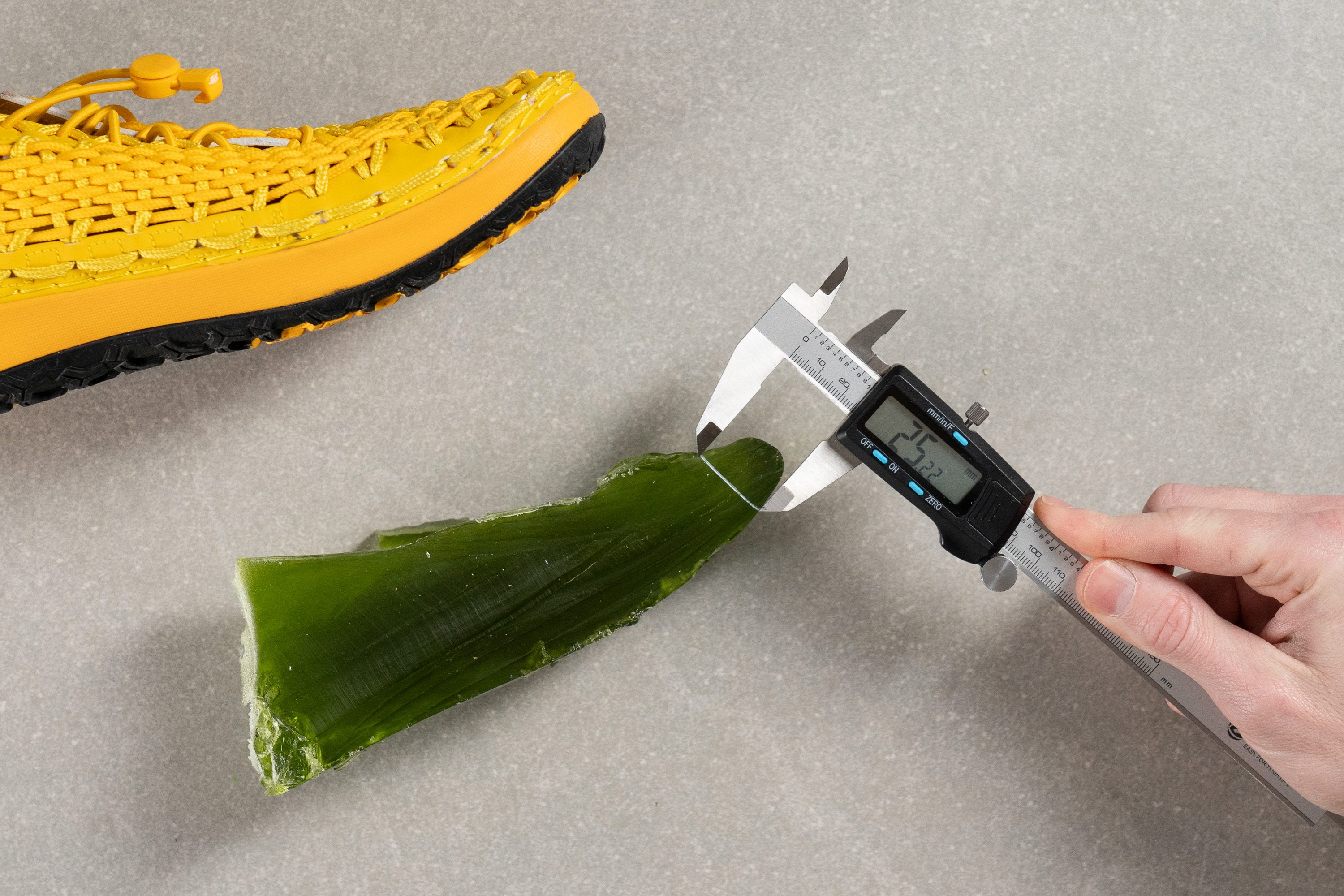
| ACG Watercat+ | 25.2 mm |
| Average | 28.0 mm |
Lacing
What Nike calls a "quick entry lacing system" worked wonders for the overall lockdown! It is essentially a bungee-lacing that is very quick and easy to regulate.
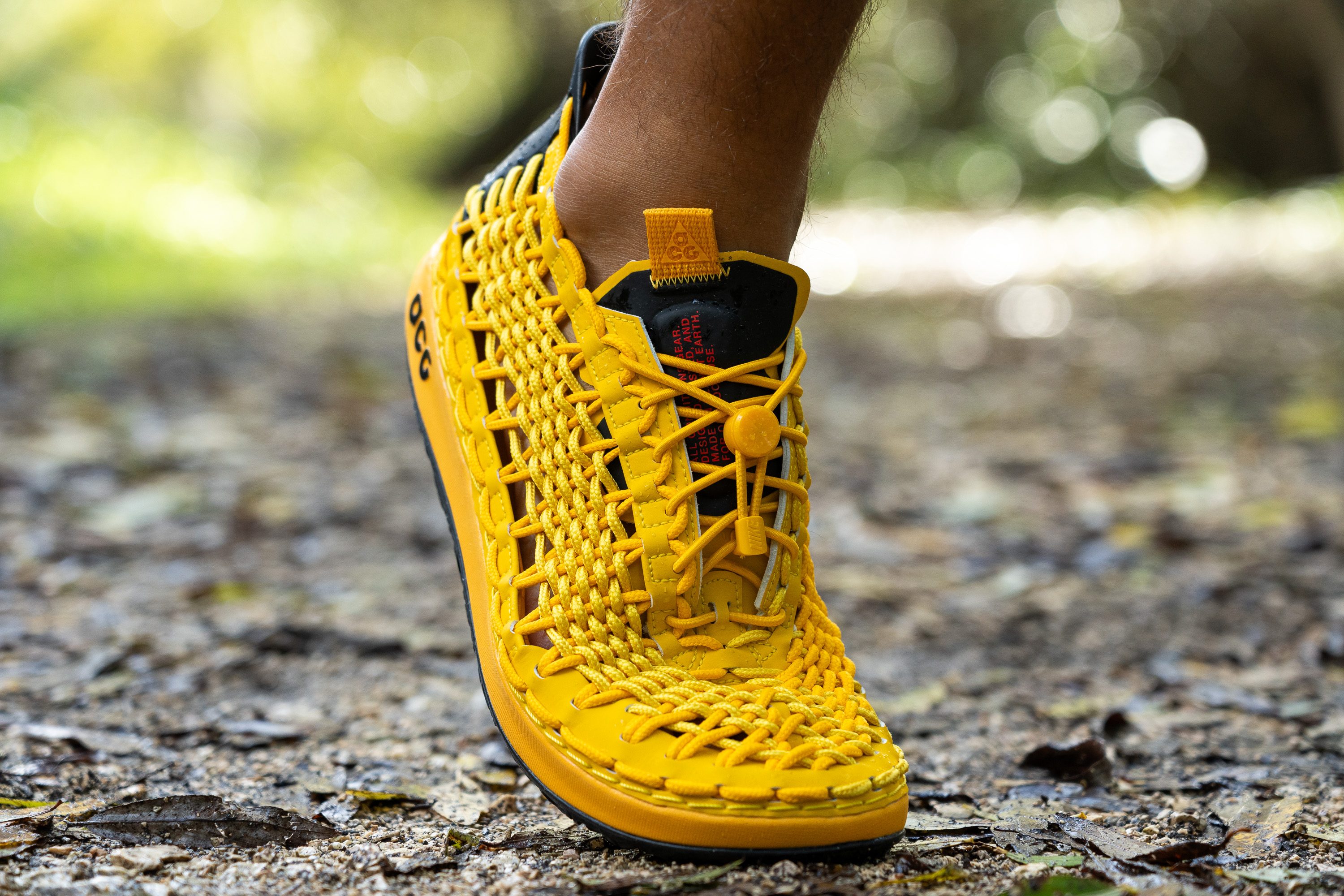
Traction / Grip
Lug depth
According to our caliper, the lugs on this Nike shoe are not so toothy at only 2.7 mm. However, they do have a clever design.
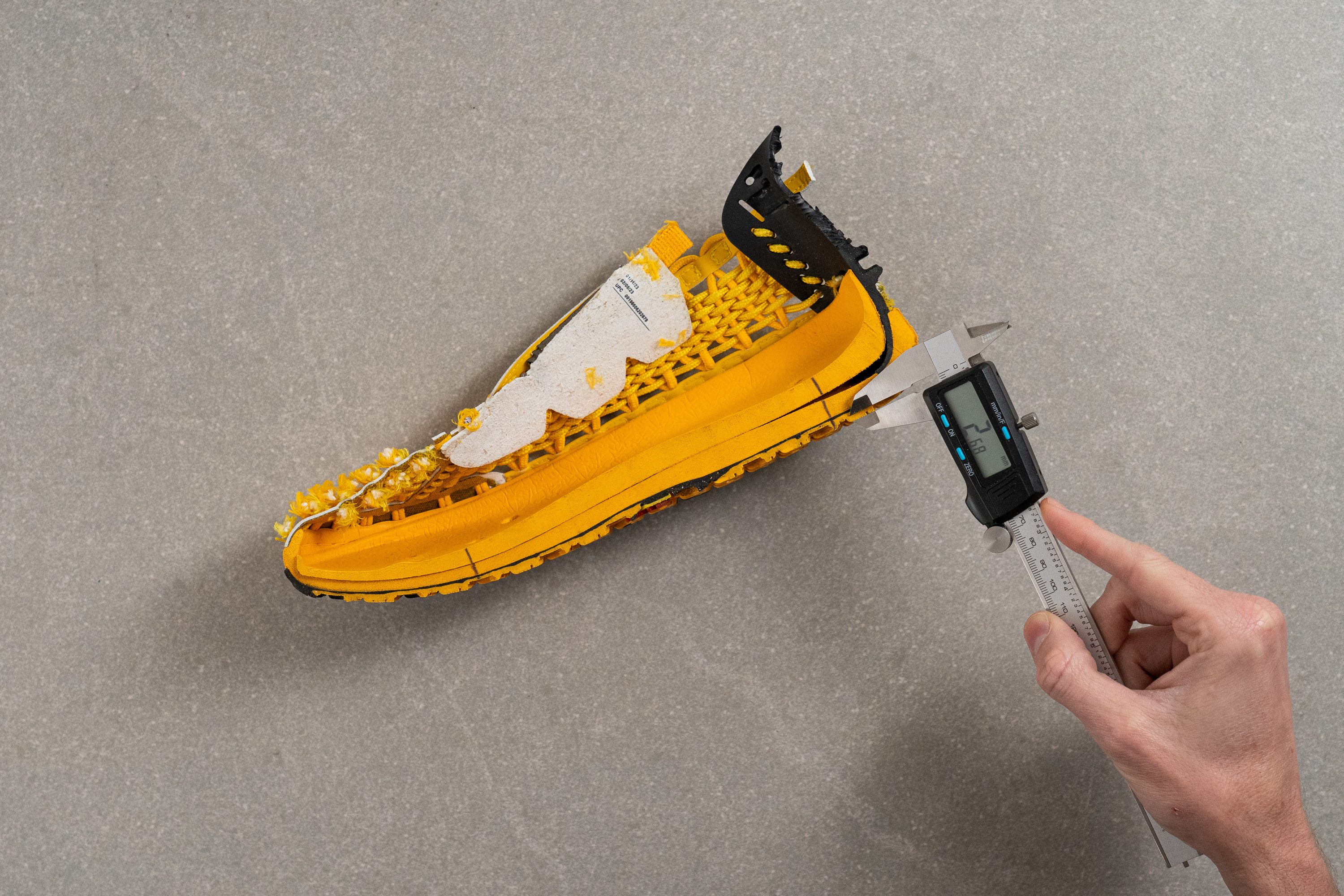
| ACG Watercat+ | 2.7 mm |
| Average | 4.0 mm |
Outsole design
The rounded, beehive-like shape of the shoe's treads offers traction in all directions at once. They also act like suction cups, especially on wet rocks.
As we were crossing a creek, stepping on shaky stones underwater, the shoe quickly adjusted to the scene and never once allowed us to slip.
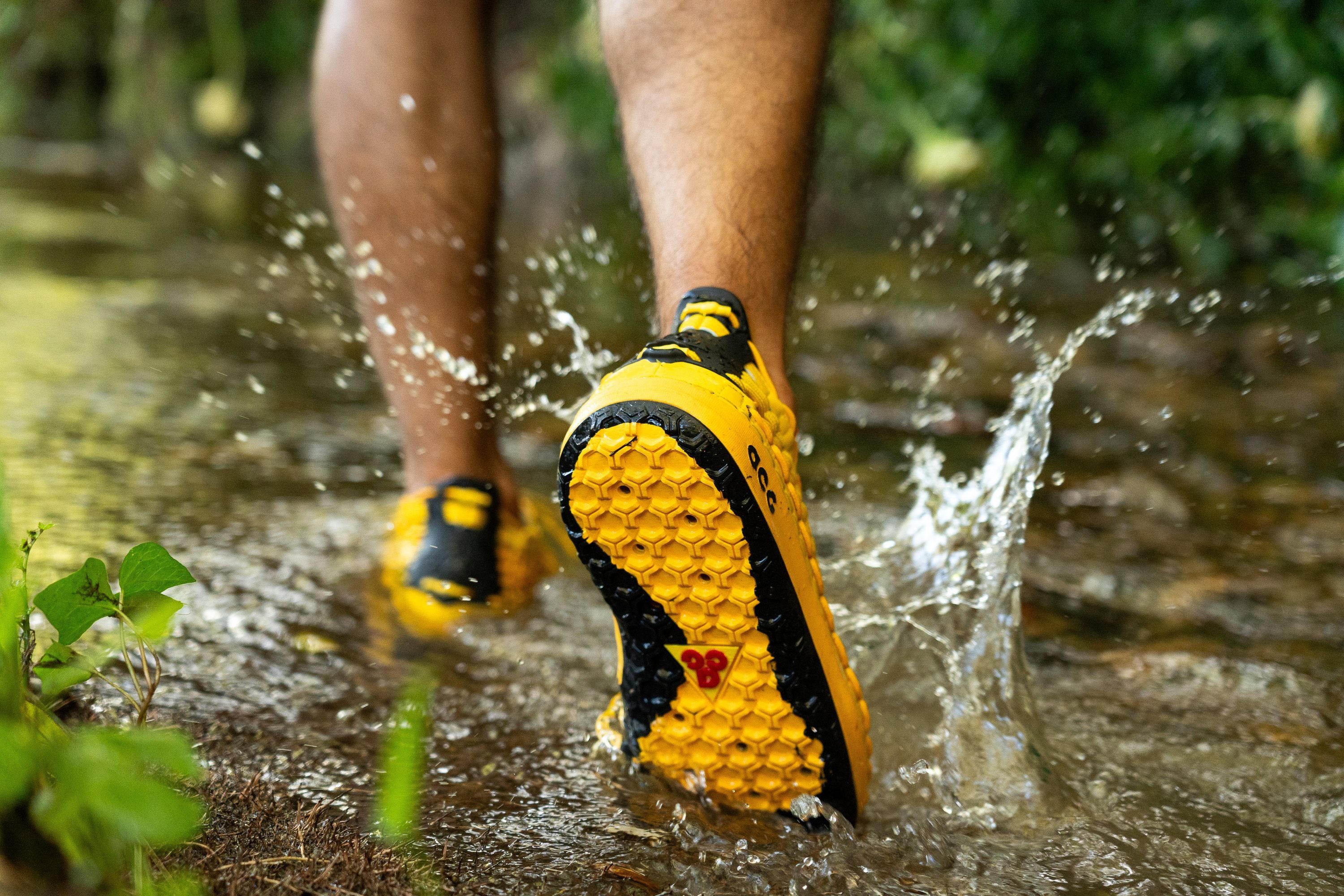
Flexibility / Stiffness
Having fun around water requires nimble feet and the ACG Watercat+ does not disappoint in that regard.
To put a number on it, we measured how much force it takes to bend this Nike shoe to a 30-degree angle and our shoe flexing tester showed 11.2N. This is one of the lowest readings we recorded in a hiking shoe which is not surprising considering the shoe's unusual design.
This is probably as barefoot as a hiking shoe can get without losing the cushioning.
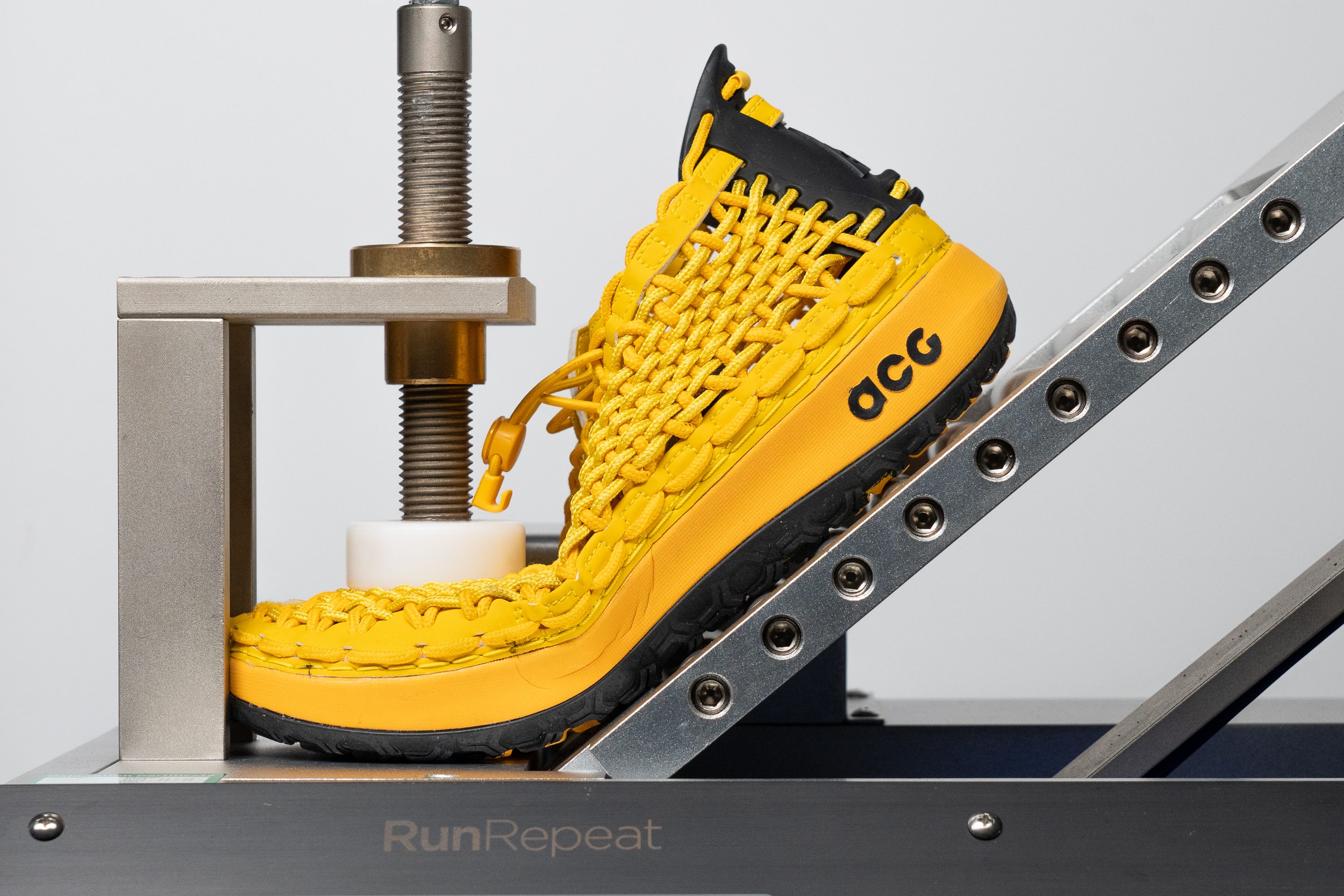
| ACG Watercat+ | 11.2N |
| Average | 18.3N |
Weight
Just by looking at the Watercat+, you can guess that it's going to be lighter than most hiking shoes. And it proved to be true on our scale.
Weighing this Nike shoe in a men's US size 9, we got 12.7 oz (359g), which is notably lighter than the average.
But if you only need a shoe for beach and swimming, the Watercat+ might be an overkill. You may prefer lighter Teva sandals like the Hurricane XLT2 (10.7 oz) or the Hurricane Drift (7.2 oz) instead.
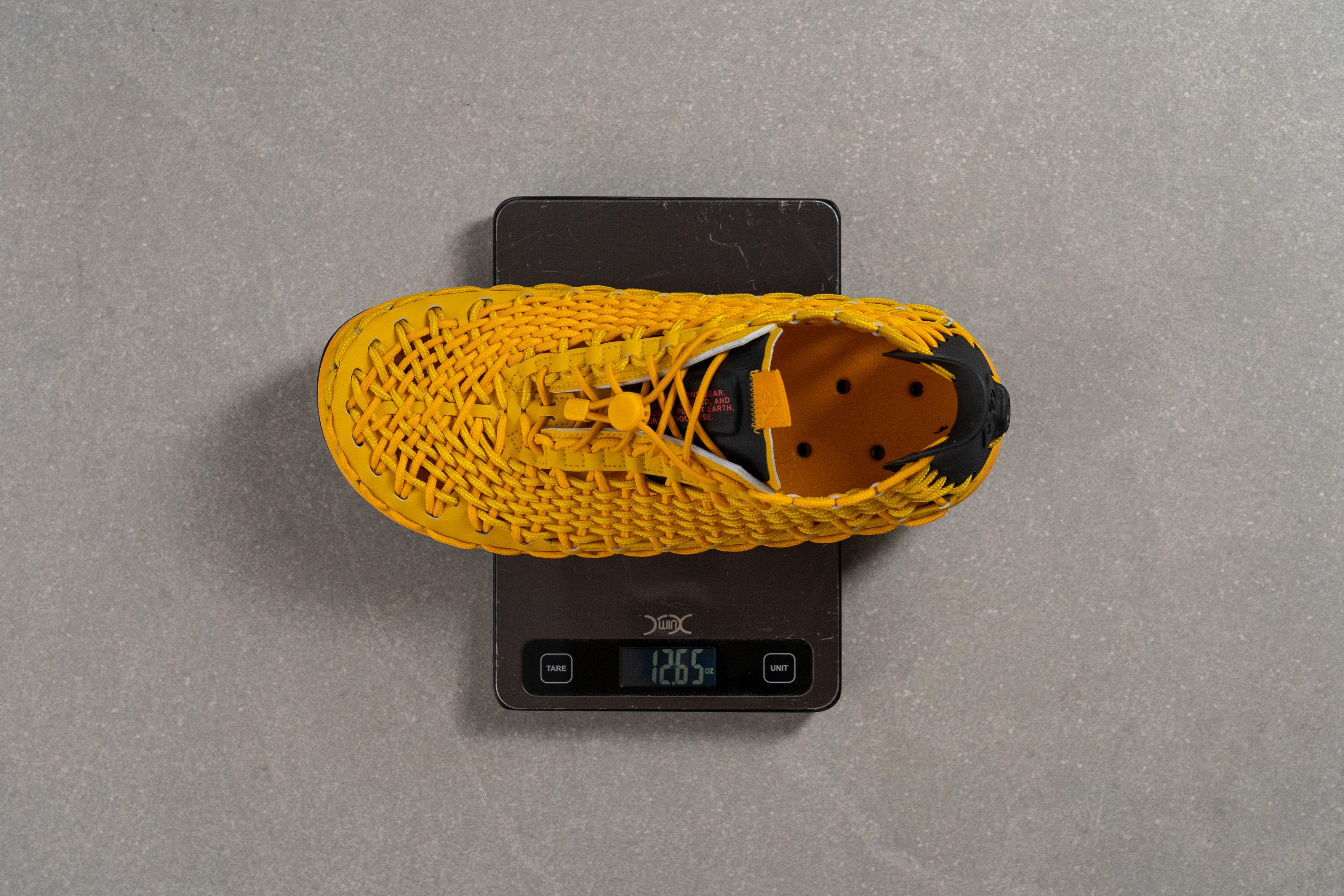
| ACG Watercat+ | 12.7 oz (359g) |
| Average | 13.4 oz (380g) |
Breathability
The indigenous-looking upper of the Watercat+ is not just there for looks! Made of woven cords with lots of space in between, this Nike shoe is breathable beyond measure!
We didn't even have to perform our usual smoke-pumping test to rate this shoe with a maximum 5/5 score.
This basket of a shoe works fabulously in the water element. It lets the water out in seconds and is super fast drying.
What's more, it's got perforations in the sole for underfoot drainage too!
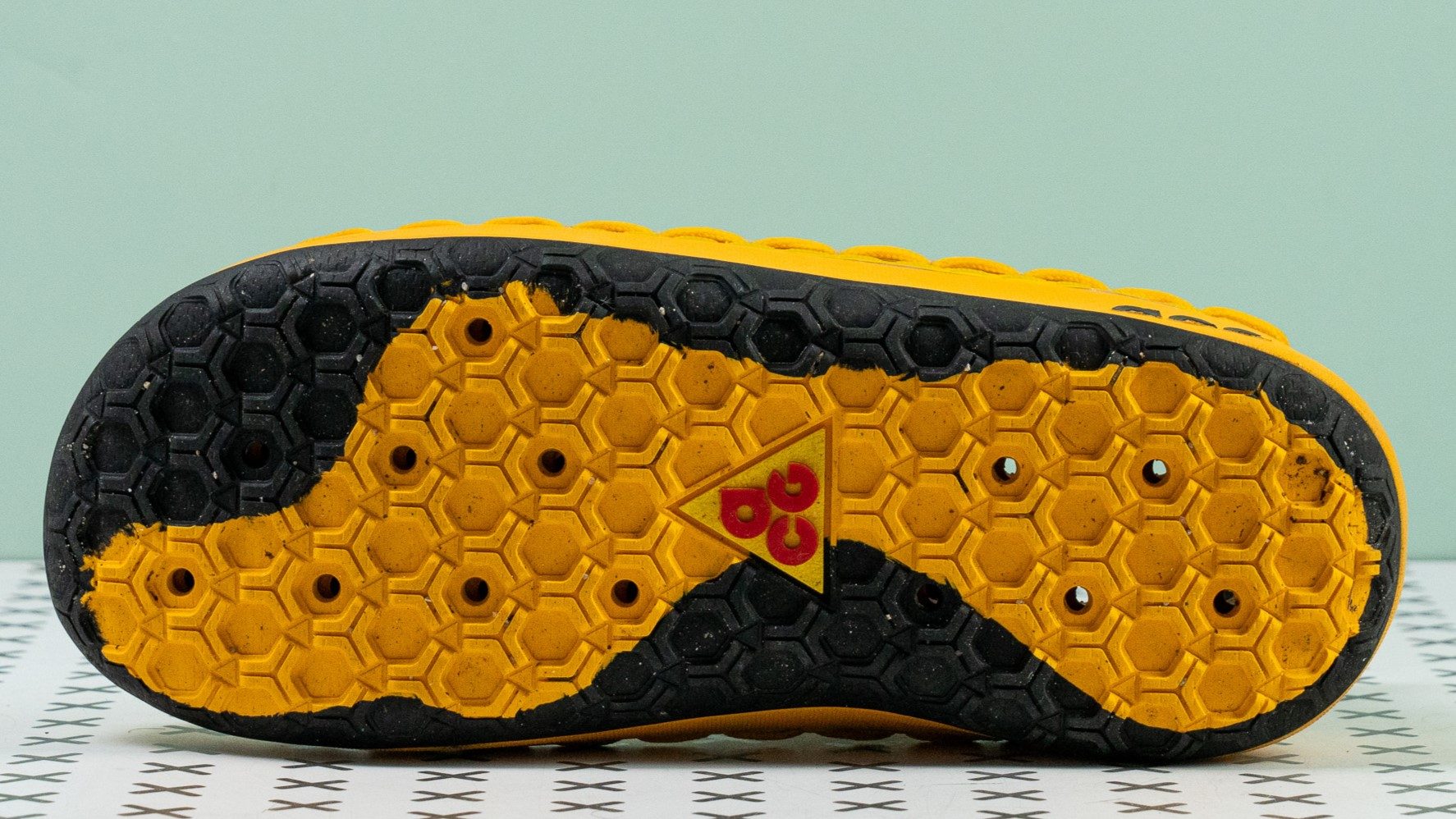
| ACG Watercat+ | 5 |
| Average | 2.4 |
Stability
Lateral stability test
The Nike ACG Watercat+ is a bad choice if you need lots of arch and ankle support.
The shoe's got a nearly minimalist construction and its wickerwork upper is certainly not capable of holding the foot securely in place.
Thus, we can only recommend this water shoe to people with neutral pronation and no special podiatric requirements. Try the KEEN Newport H2 if you want to brave the wet element with support.
Torsional rigidity
The Watercat+ is as flexible as a shoe can be!
On a 1-5 scale, where 5 is the stiffest, our manual test showed that this Nike shoe deserves 1! And that is when most hiking shoes score 4 on average.
Certainly not a lot of torsional rigidity for proper arch support.
| ACG Watercat+ | 1 |
| Average | 3.7 |
Heel counter stiffness
Checking the shoe's heel counter, we observe the exact same pliability.
Once again, the Watercat+ receives the lowest possible score for stiffness. This time, it's 1 for the heel counter stiffness.
That's good news for someone with sensitive ankles or one who despises firm ankle hold in footwear.
| ACG Watercat+ | 1 |
| Average | 3.7 |
Midsole width - forefoot
Measuring the shoe's midsole width, we got 106.2 mm in the widest part of the forefoot. This is a little narrower than average but is very well compensated by the wide midfoot and heel.
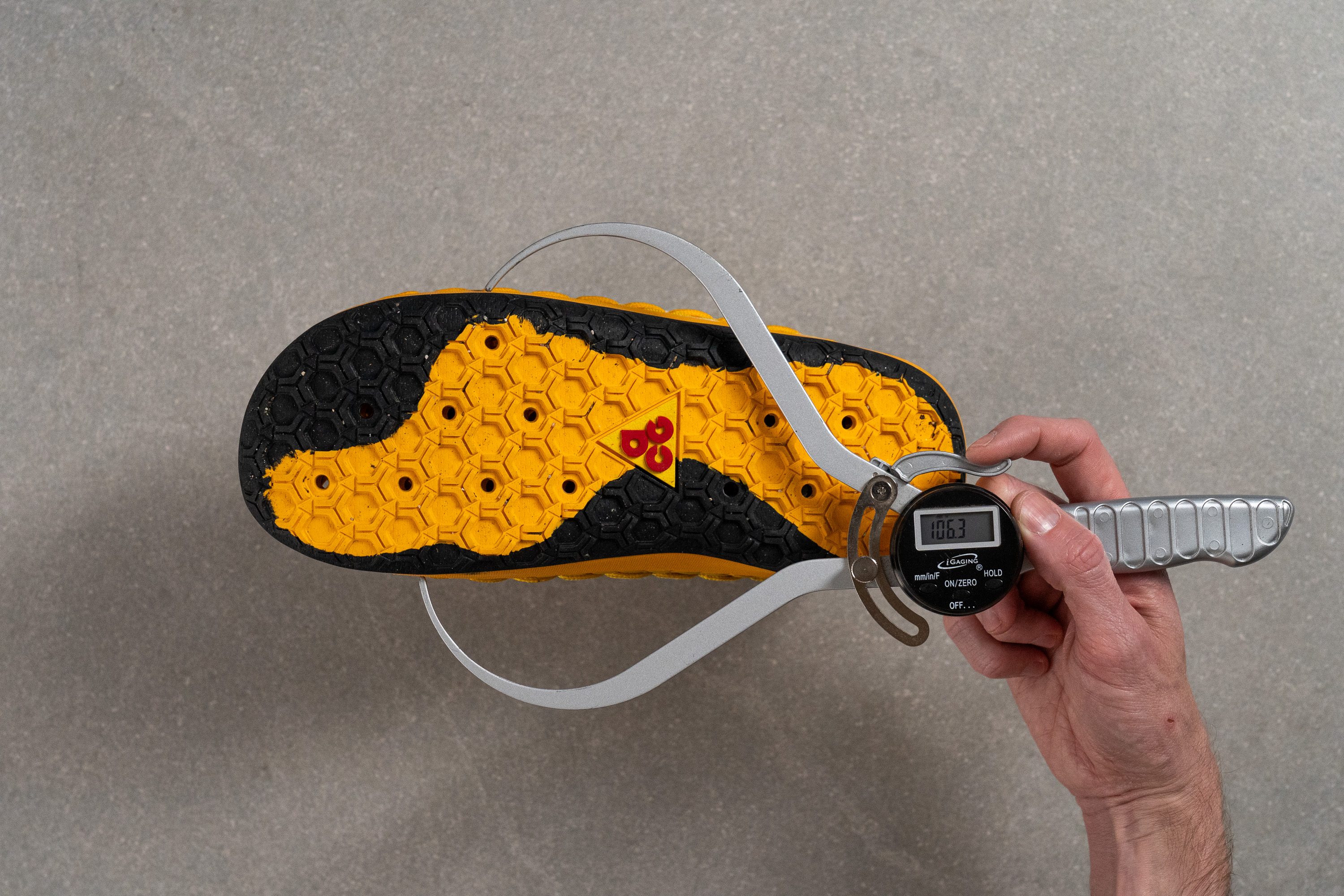
| ACG Watercat+ | 106.3 mm |
| Average | 111.3 mm |
Midsole width - heel
The heel part of the midsole actually turned out to be wider than average at 92.0 mm.
Overall, we had a very surefooted experience in the Nike ACG Watercat+. Its platform was wide enough to balance on unpredictable terrain around the water bodies. But at the same time, it wasn't too wide to feel bulky or clumsy.
Just right for a water shoe!
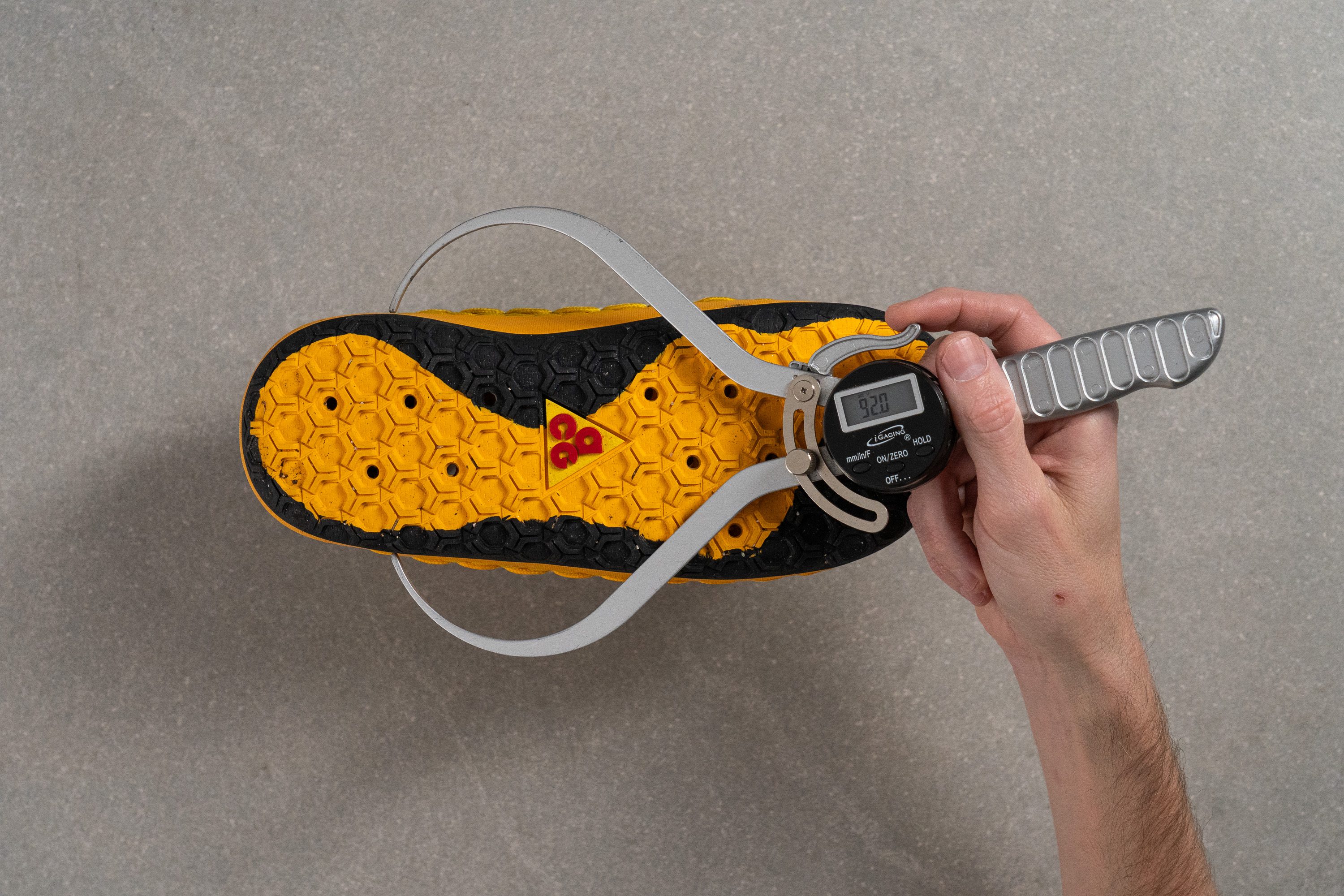
| ACG Watercat+ | 92.0 mm |
| Average | 87.9 mm |
Durability
Toebox durability
Even if you only use the Nike ACG Watercat+ for water sports, there is still a chance of bumping into sharp rocks, corals, or protruding roots on the river banks. Although we don't have all these hazards in the lab, we do have a relentless Dremel.
Applying the tool to the shoe's topmost cord for 12 seconds, it failed to even cut the cord in half! Wow, that's truly impressive, especially compared to a typical single-layered upper (like the shoe on the right).
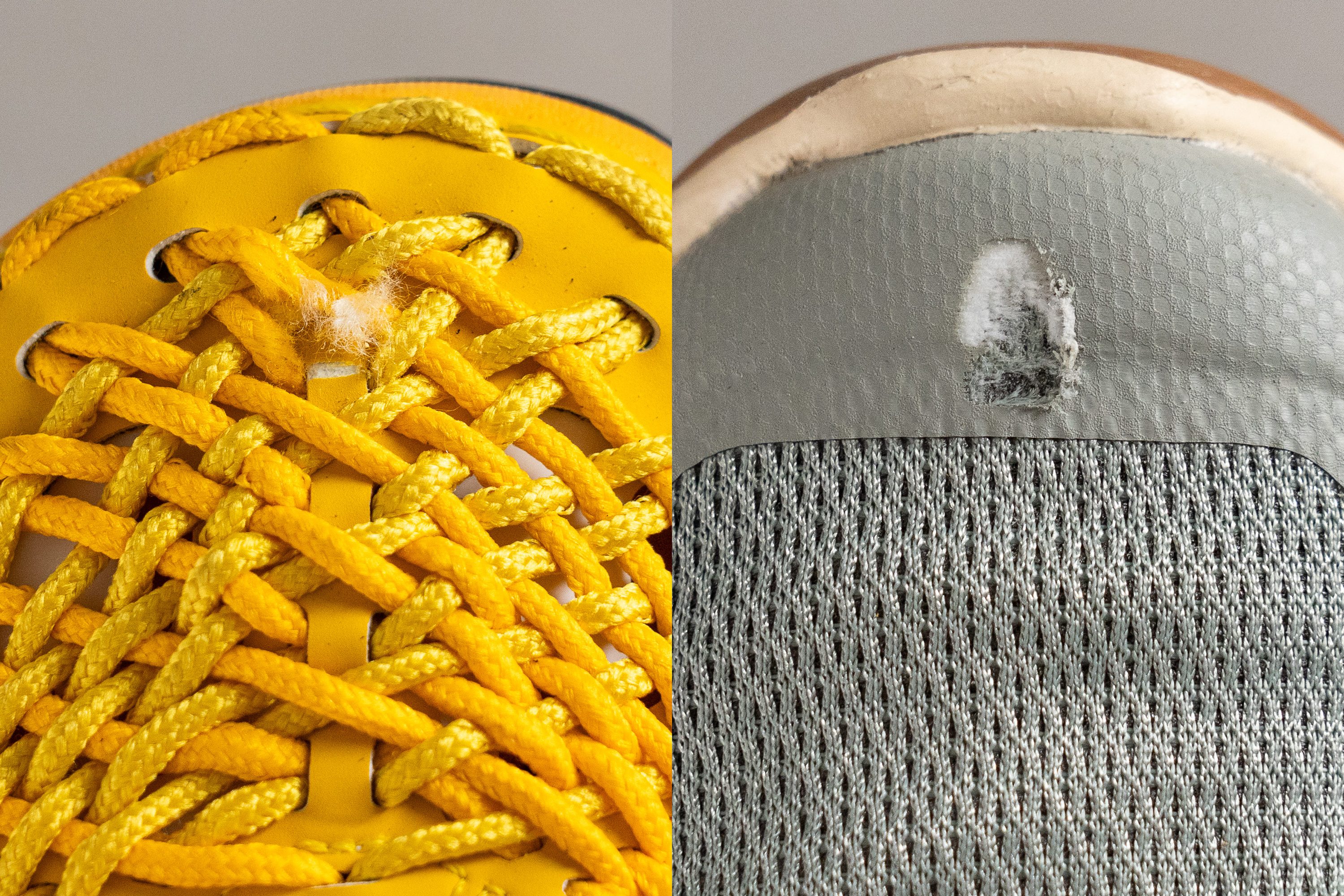
This earned the Watercat a solid 5 out of 5 for toebox durability.
Feeling intrigued, we also peeked at the shoe's weave pattern through a microscope. What we saw was an impressively thick intertwining of extra-thick cords.
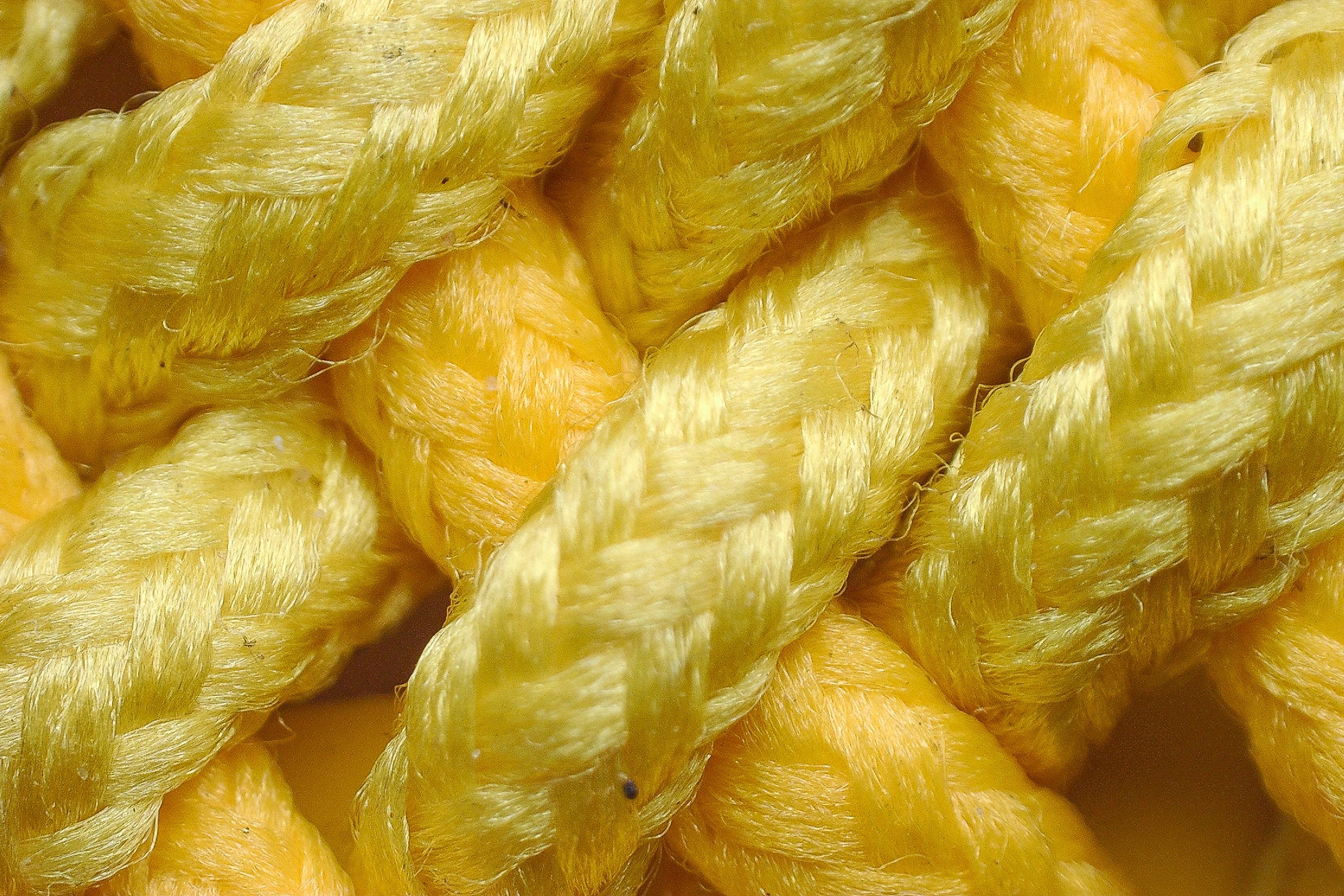
| ACG Watercat+ | 5 |
| Average | 3.7 |
Heel padding durability
Nike took really good care of the shoe's collar by placing a molded, soft plastic/rubber piece at the heel. It worked very well to keep our ankles free from chafing and turned out to be pretty wear-resistant itself!
We let the Dremel work for 4 seconds and found that it only scratched the surface of this rubber piece! Given how much this test normally messes up mesh/synthetic-lined collars, this shoe's heel padding durability deserves a maximum 5/5 score.
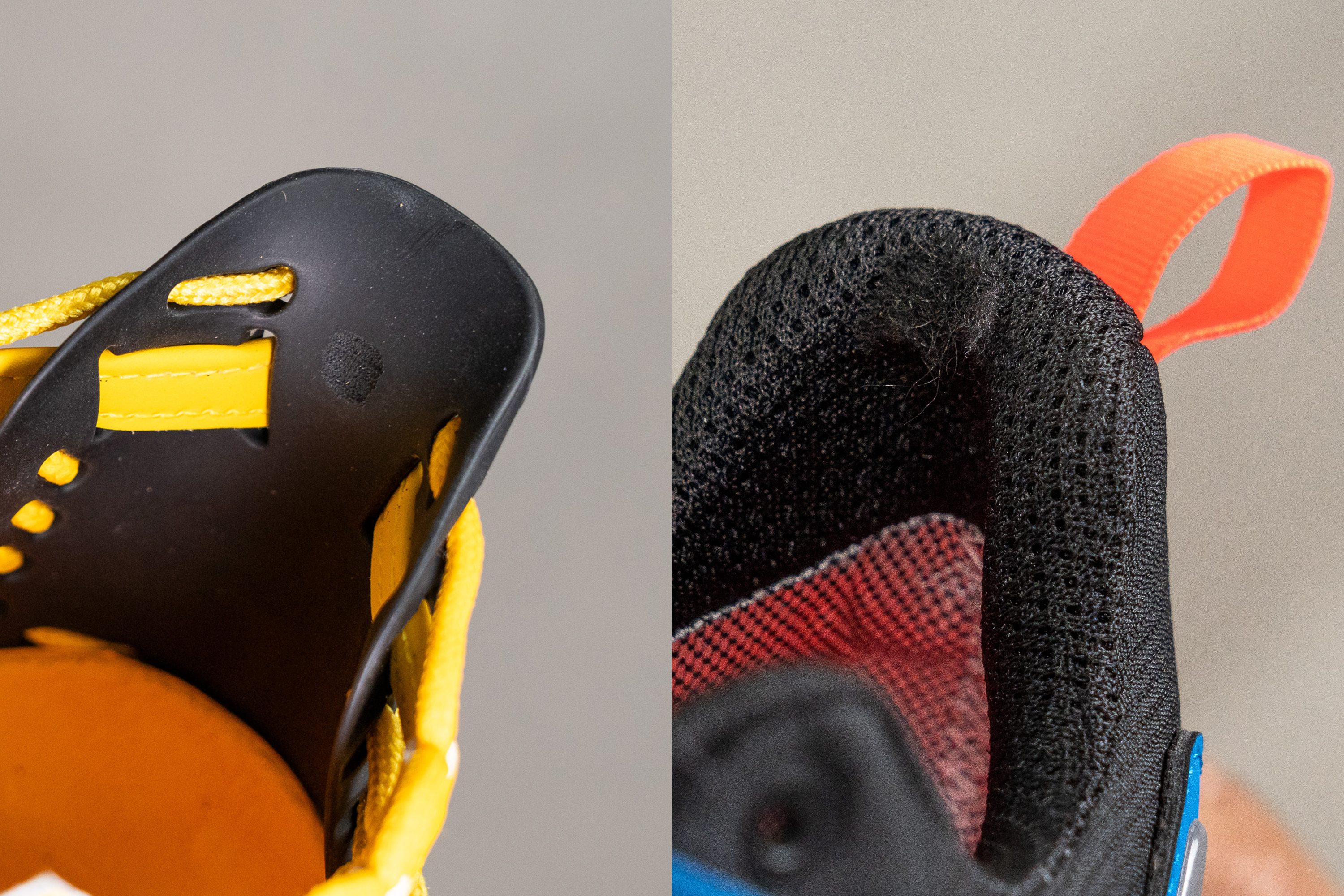
| ACG Watercat+ | 5 |
| Average | 3 |
Outsole hardness
Because the Nike Watercat+ is intended for pretty abrasive surfaces, we expected nothing less than a hard-wearing outsole.
Because rubber durability often correlates with hardness, we used a durometer to measure the shoe's outsole firmness. Seeing 83.0 HC on the tool, we found that the shoe's rubber is just as hard as the average hiking shoe.
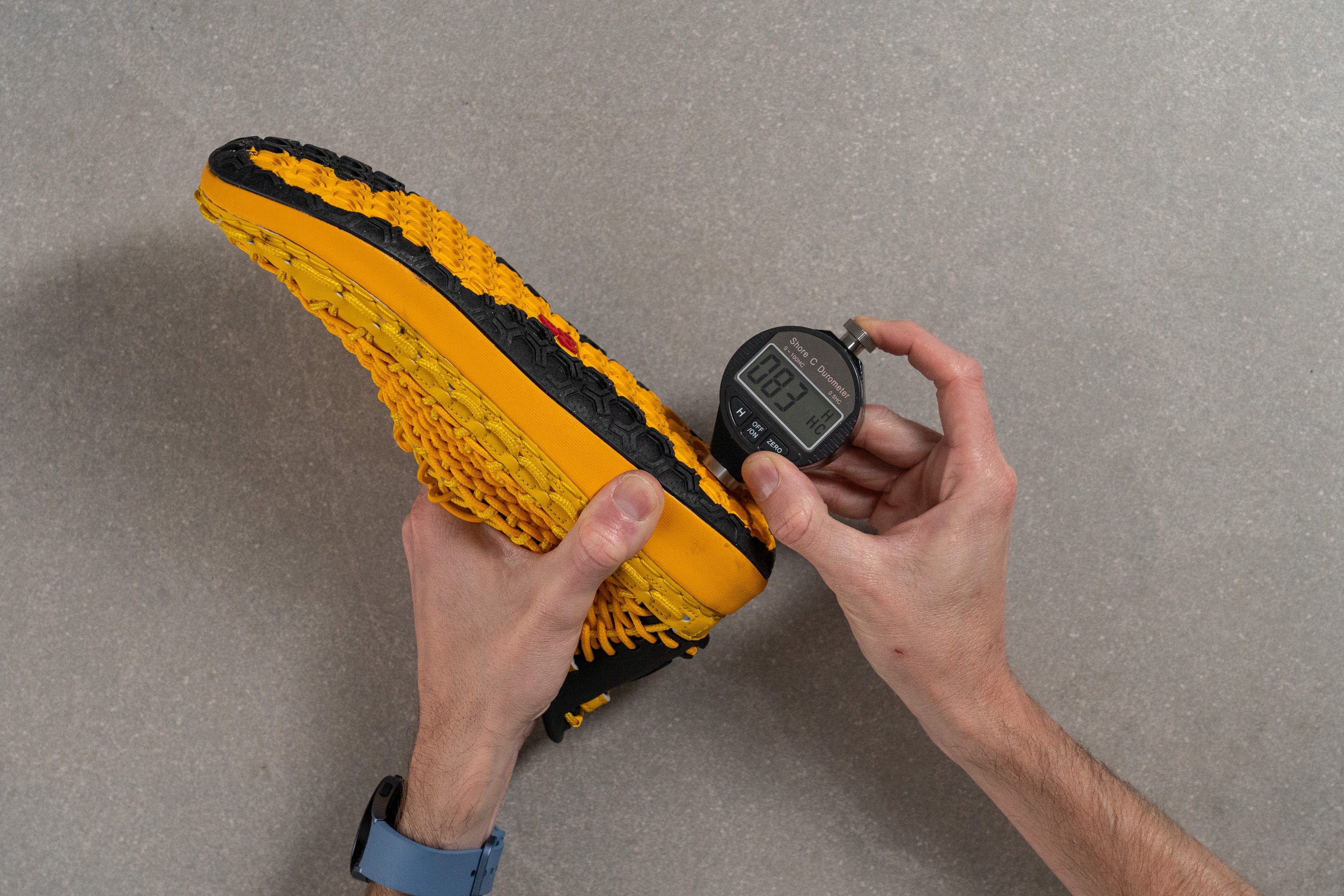
| ACG Watercat+ | 83.0 HC |
| Average | 85.1 HC |
Outsole durability
To further scrutinize the shoe's outsole strength, we applied a Dremel to it for a whole 22 seconds. We made sure that the pressure (3.2N) and speed (10K RPM) were consistent.
And the end result was very uplifting! The tool only bit 0.8 mm of the rubber! This is even less than the average damage among hiking shoes.
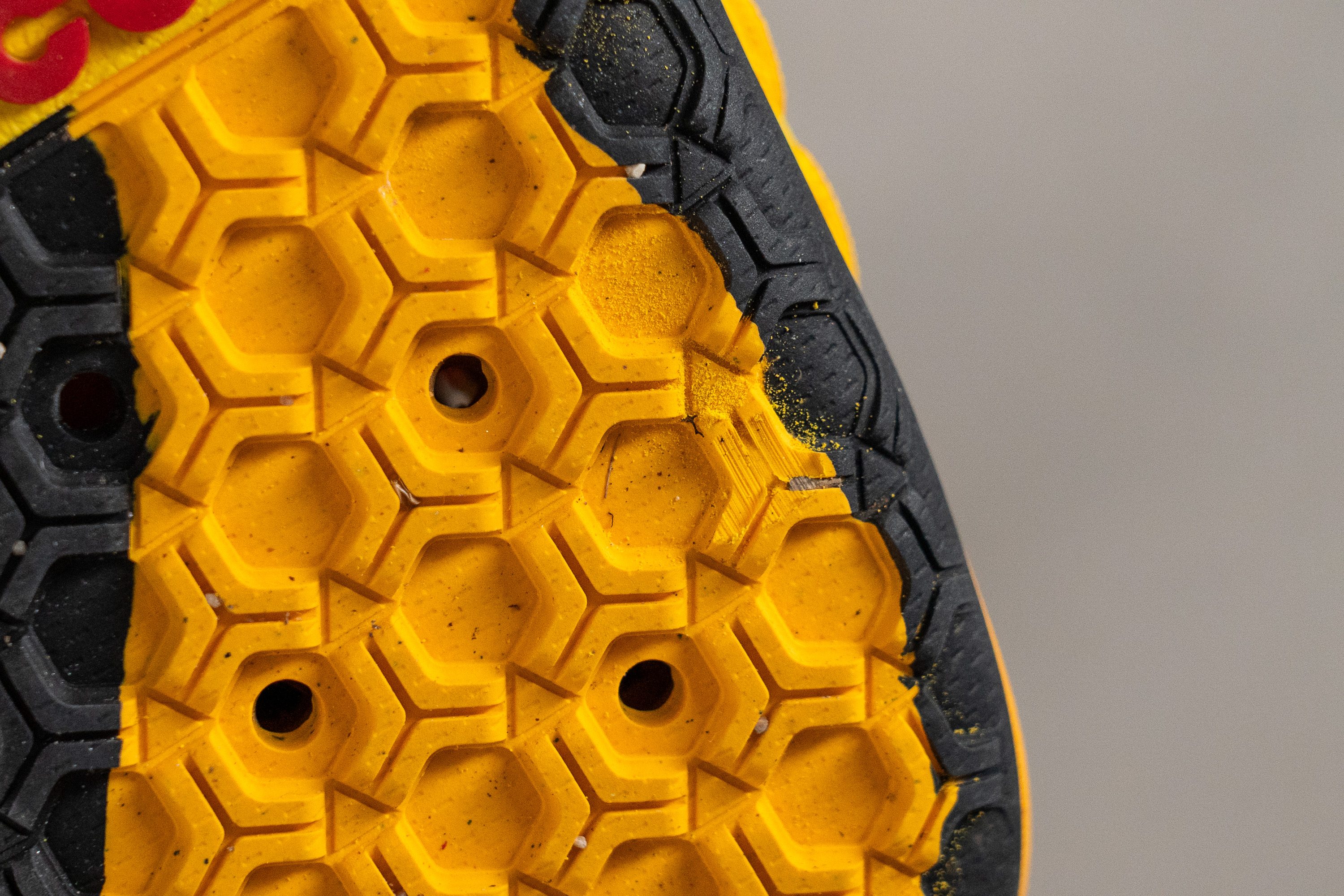
| ACG Watercat+ | 0.8 mm |
| Average | 1.0 mm |
Outsole thickness
We also used a caliper to measure how thick the shoe's rubber layer is. Without lugs, the outsole turned out to be 2.5 mm thick, which is typical for a hiking shoe.
To sum it up, we expect a long life from the Nike ACG Watercat+'s rubber bottom! Don't be misled by the shoe's unconventional design because its outsole has the full capacity of a traditional hiking shoe.
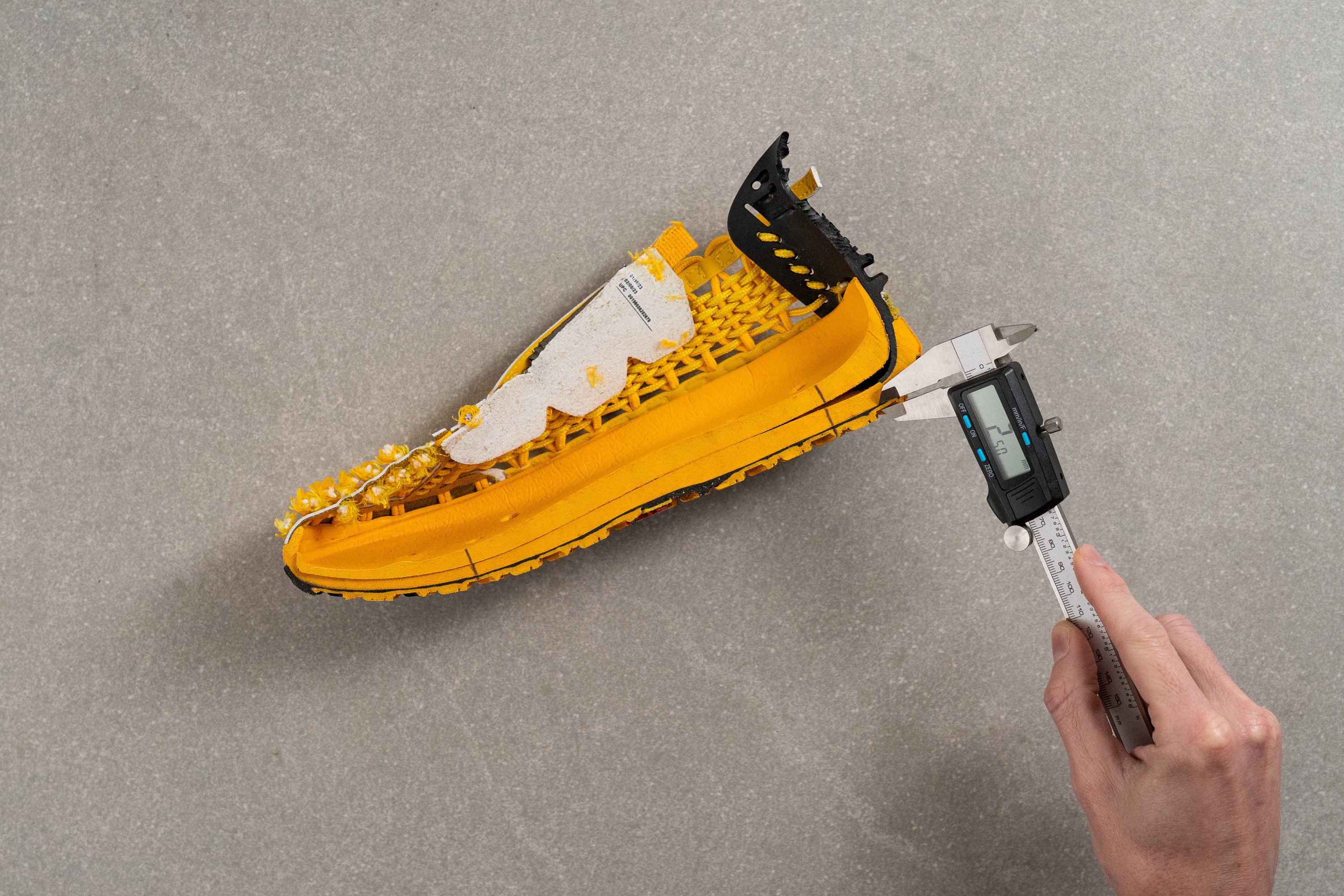
| ACG Watercat+ | 2.5 mm |
| Average | 2.5 mm |
Misc
Insole thickness
The main reason why the Watercat+ doesn't necessarily feel firm underfoot is its miraculous insole. It has a much plusher nature than the primary foam and is also twice as thick as the average insole!
Based on our caliper, it is a whopping 8.6 mm thick!
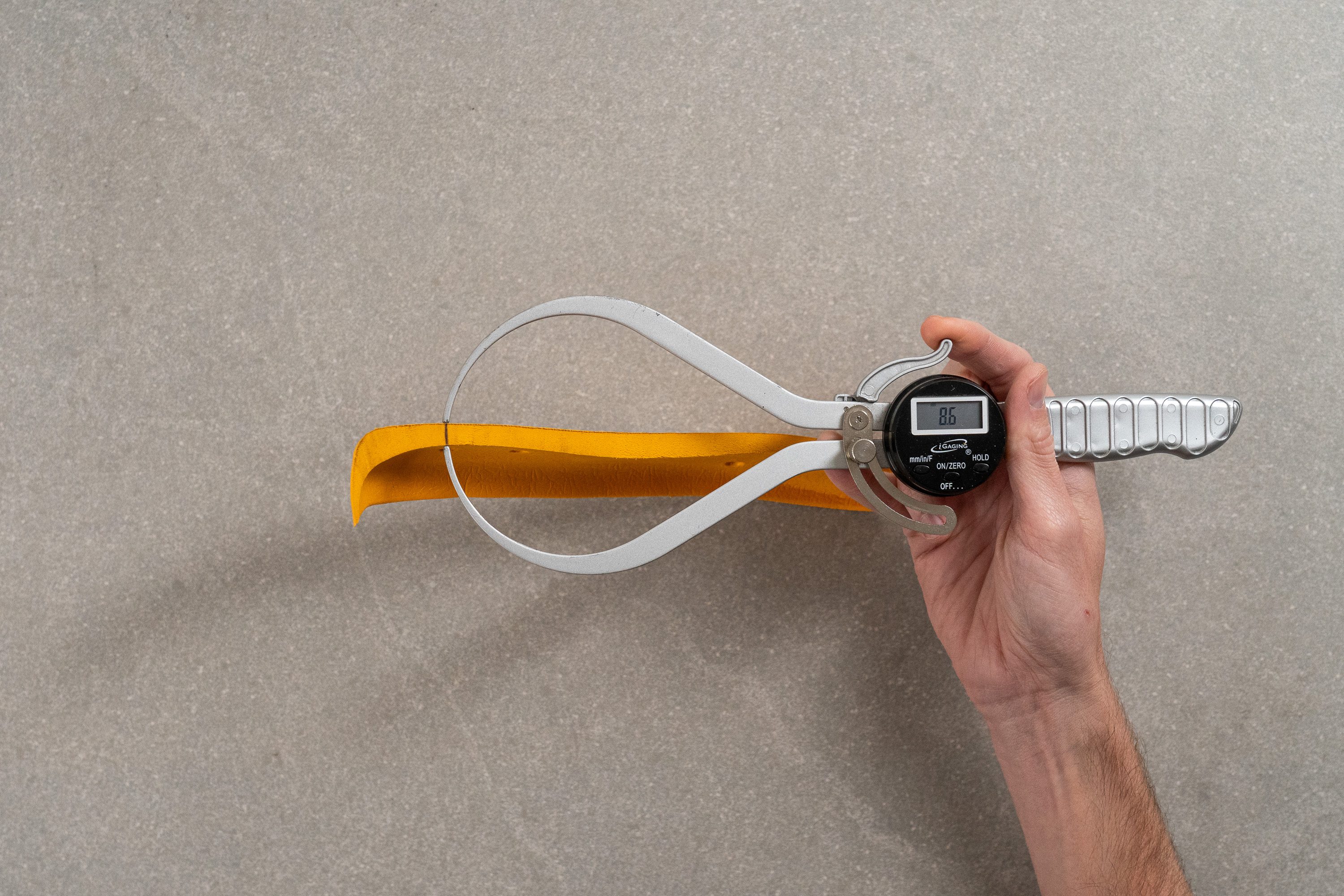
| ACG Watercat+ | 8.6 mm |
| Average | 5.3 mm |
Removable insole
The shoe's insole can be removed but you probably wouldn't want to do that because it comes with drainage holes and is much thicker than average.
Inserting a sockliner that's thinner than 8 mm will create more room inside the shoe but you don't want that in the already spacious Nike ACG Watercat+.
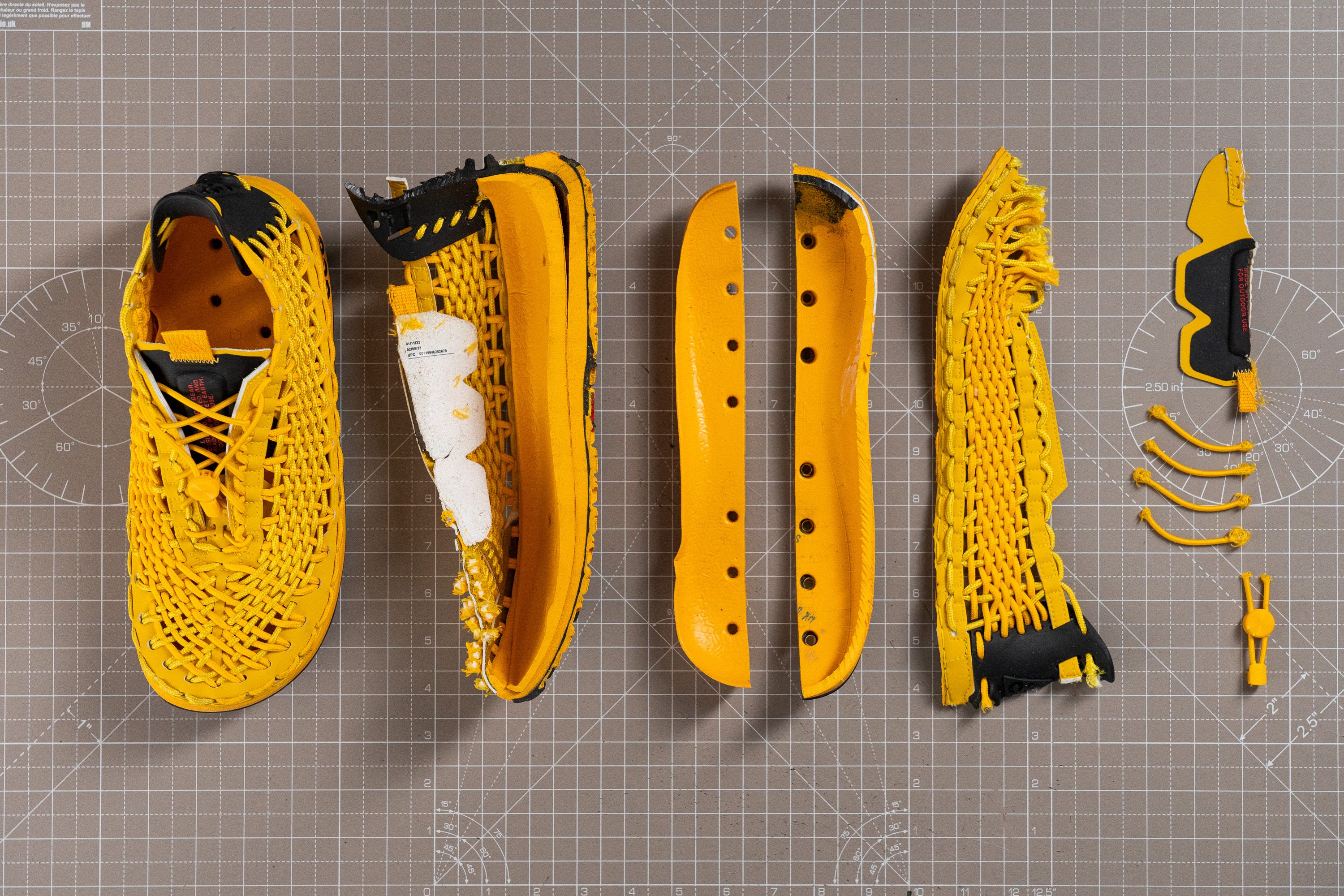
| ACG Watercat+ | Yes |
Reflective elements
Better be home before dark!
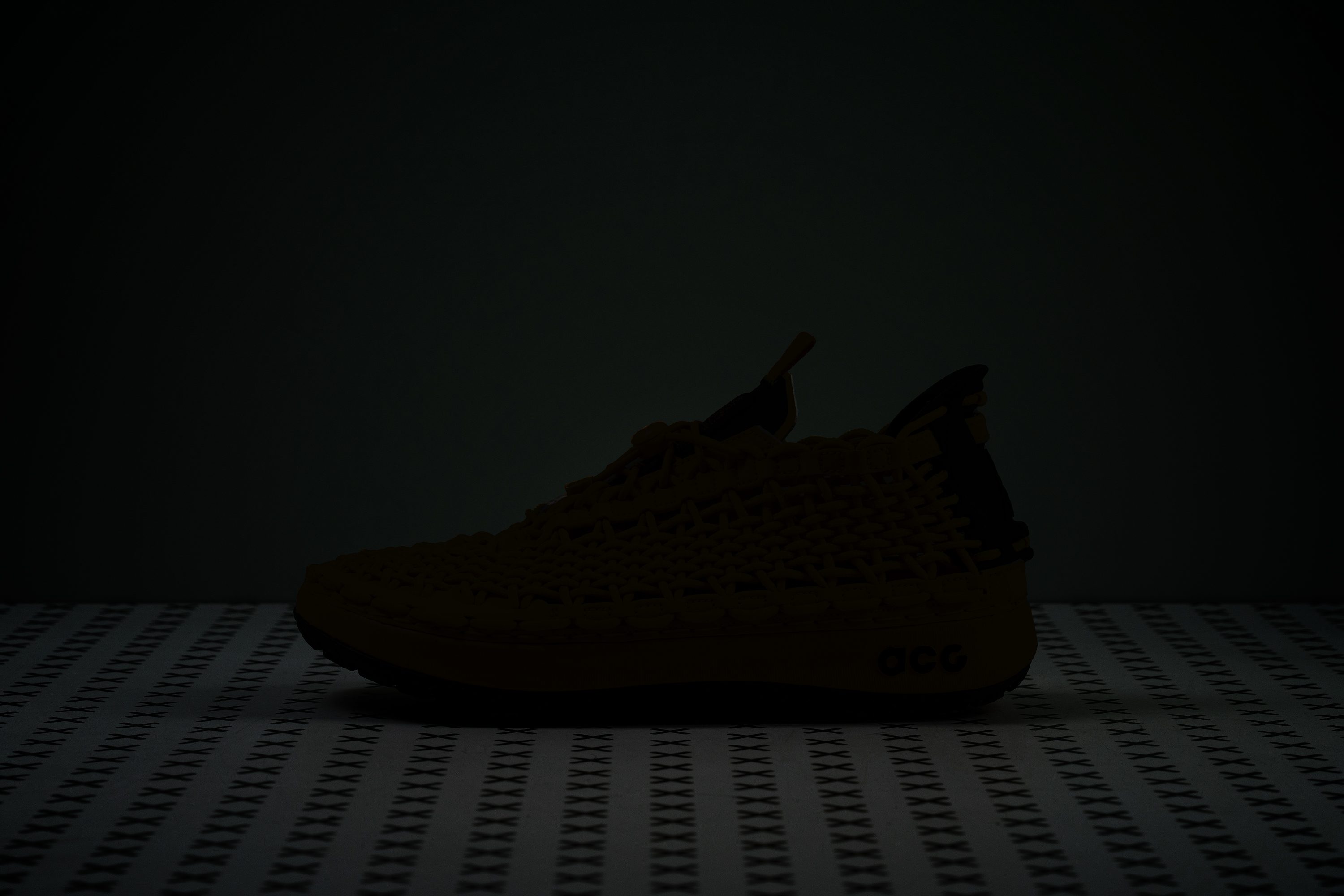
| ACG Watercat+ | No |
Tongue padding
You might be wondering how a wickerwork shoe like that feels against the foot from the inside. In a word...Marvelous!
The cords are pretty soft and the tongue is lightly padded (5.3 mm), making this Nike shoe feel amazing against bare feet! No lace bites, pressure, or discomfort.
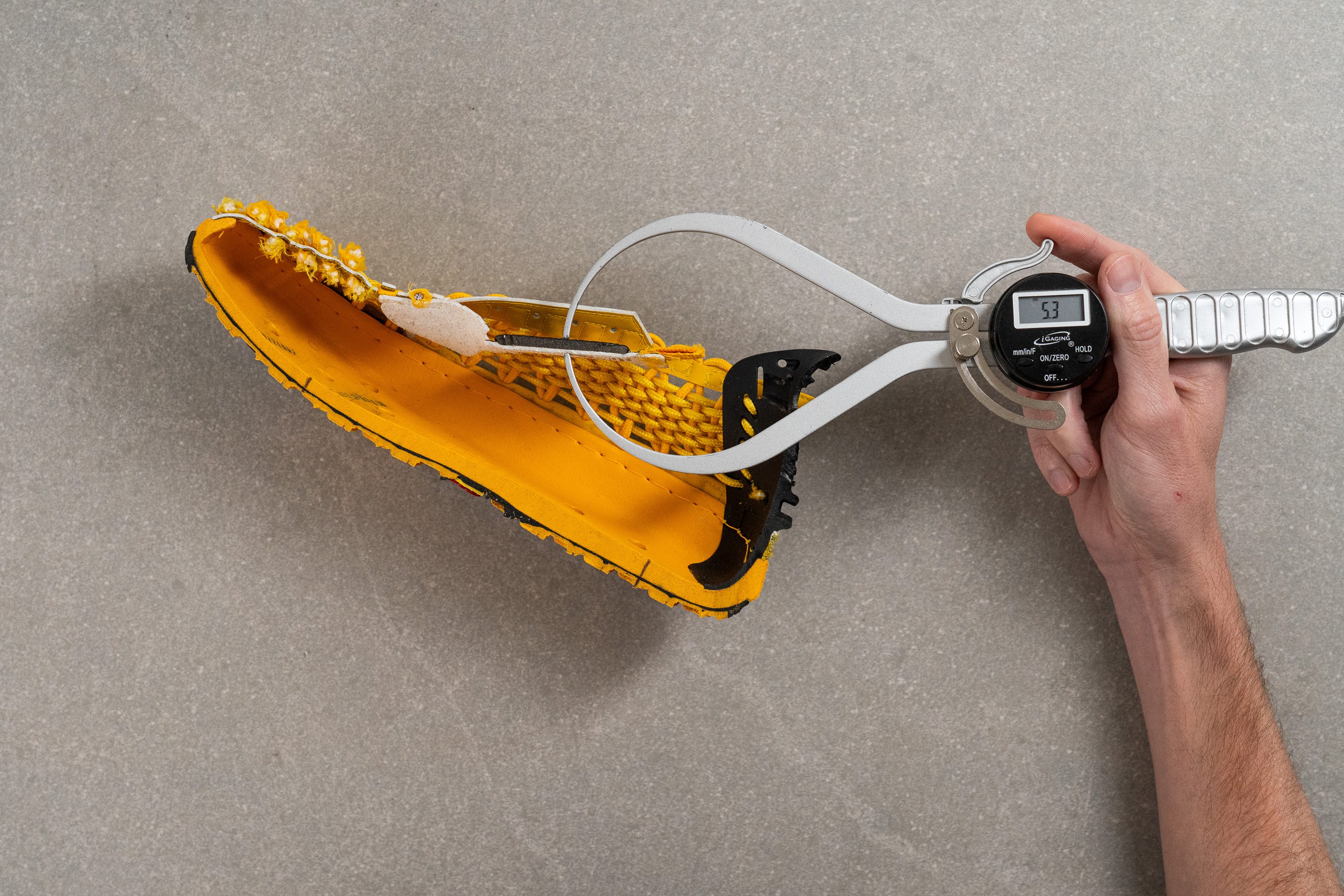
| ACG Watercat+ | 5.3 mm |
| Average | 10.2 mm |
Tongue: gusset type
The Watercat's tongue is not gusseted but given the shoe's unique upper design, it was never an issue and the foothold was never missing.
The woven upper wrapped comfortably around our feet from the start. It has a subtle texture inside which kept our feet from sliding throughout the hike.
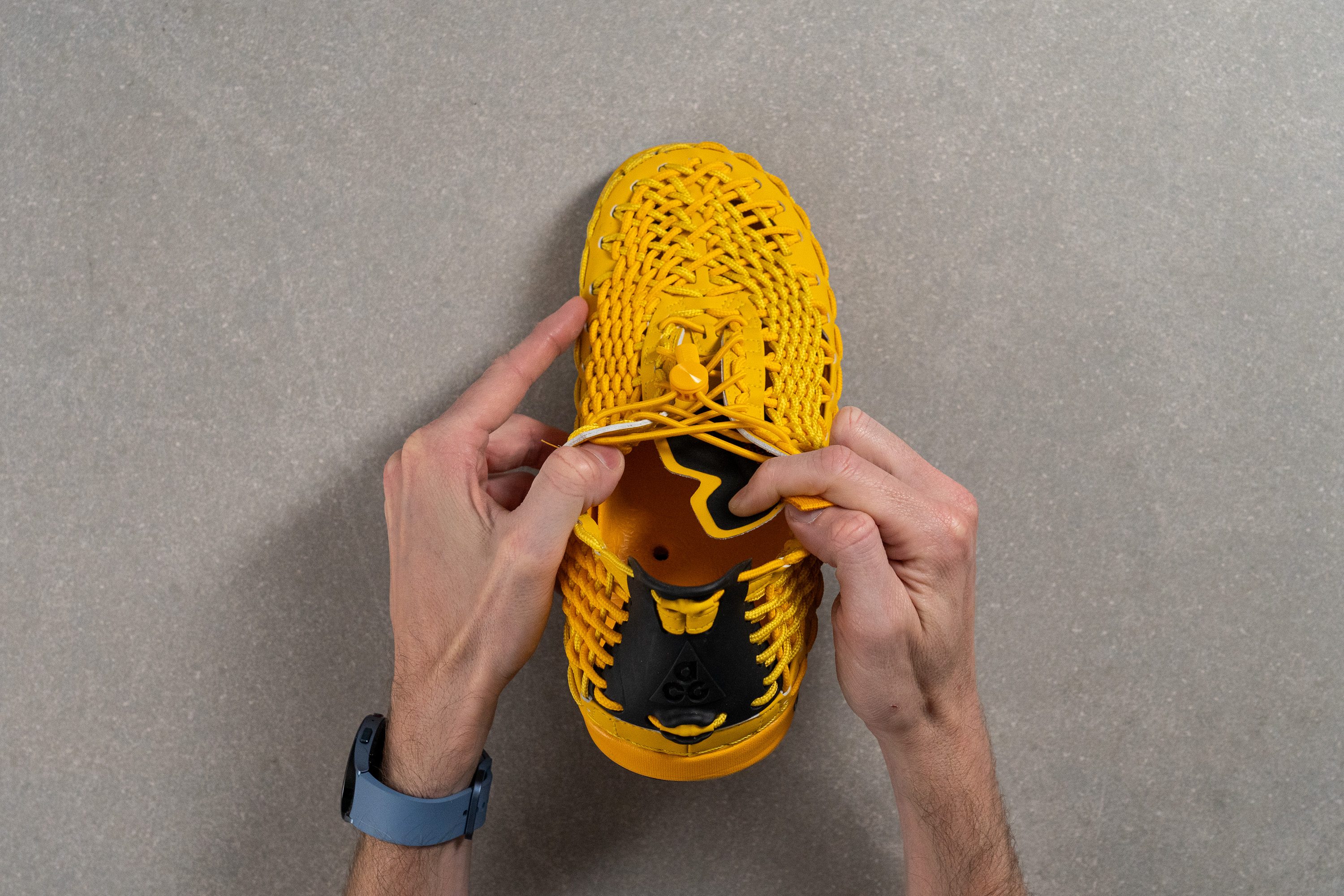
| ACG Watercat+ | None |
Heel tab
The shoe comes with a pull tab on the tongue but we just ended up grabbing the whole tongue and the little rubber piece on the heel to get the Watercat+ on.
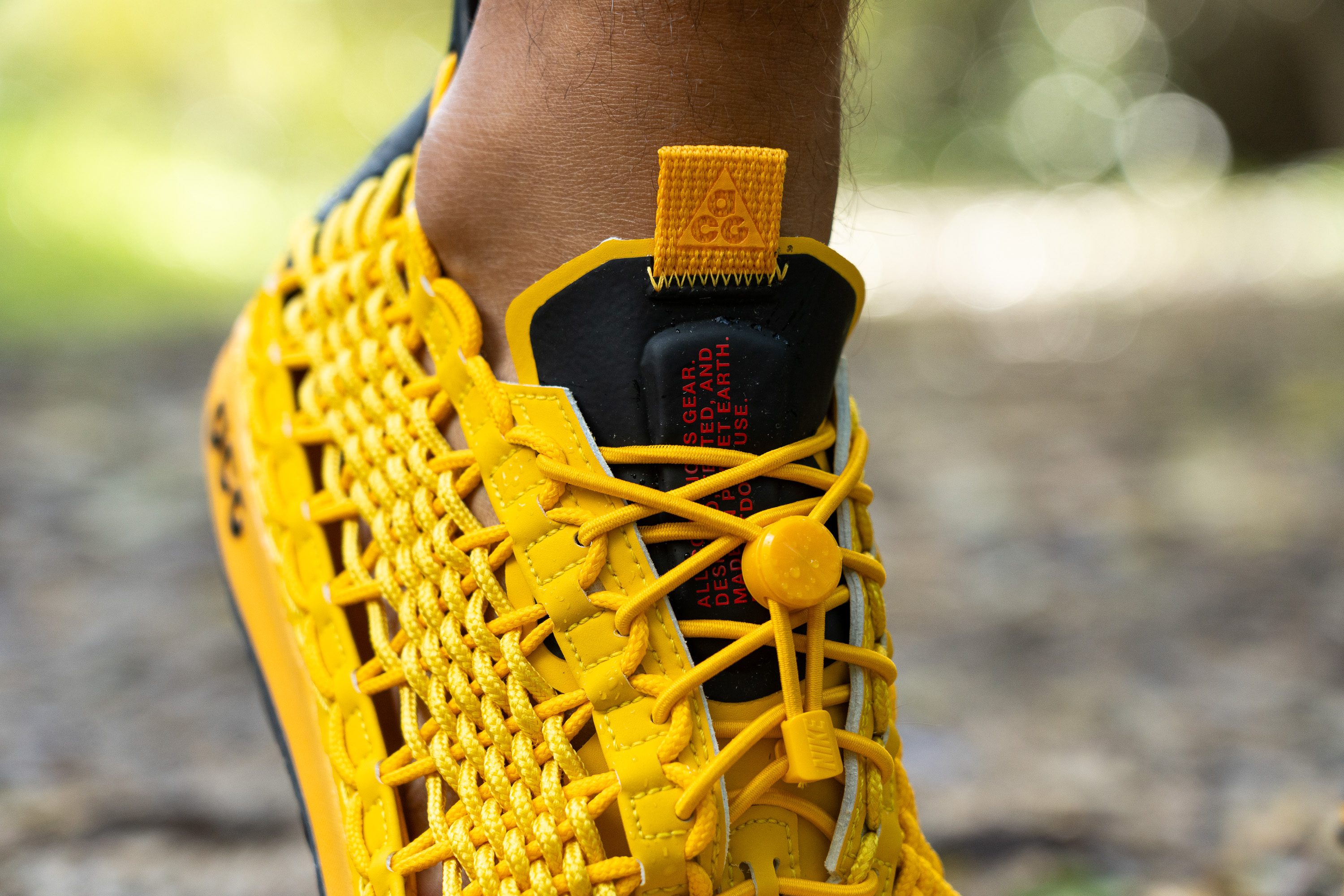
Don't let the look of the shoe intimidate you - it took us mere seconds to slip inside!
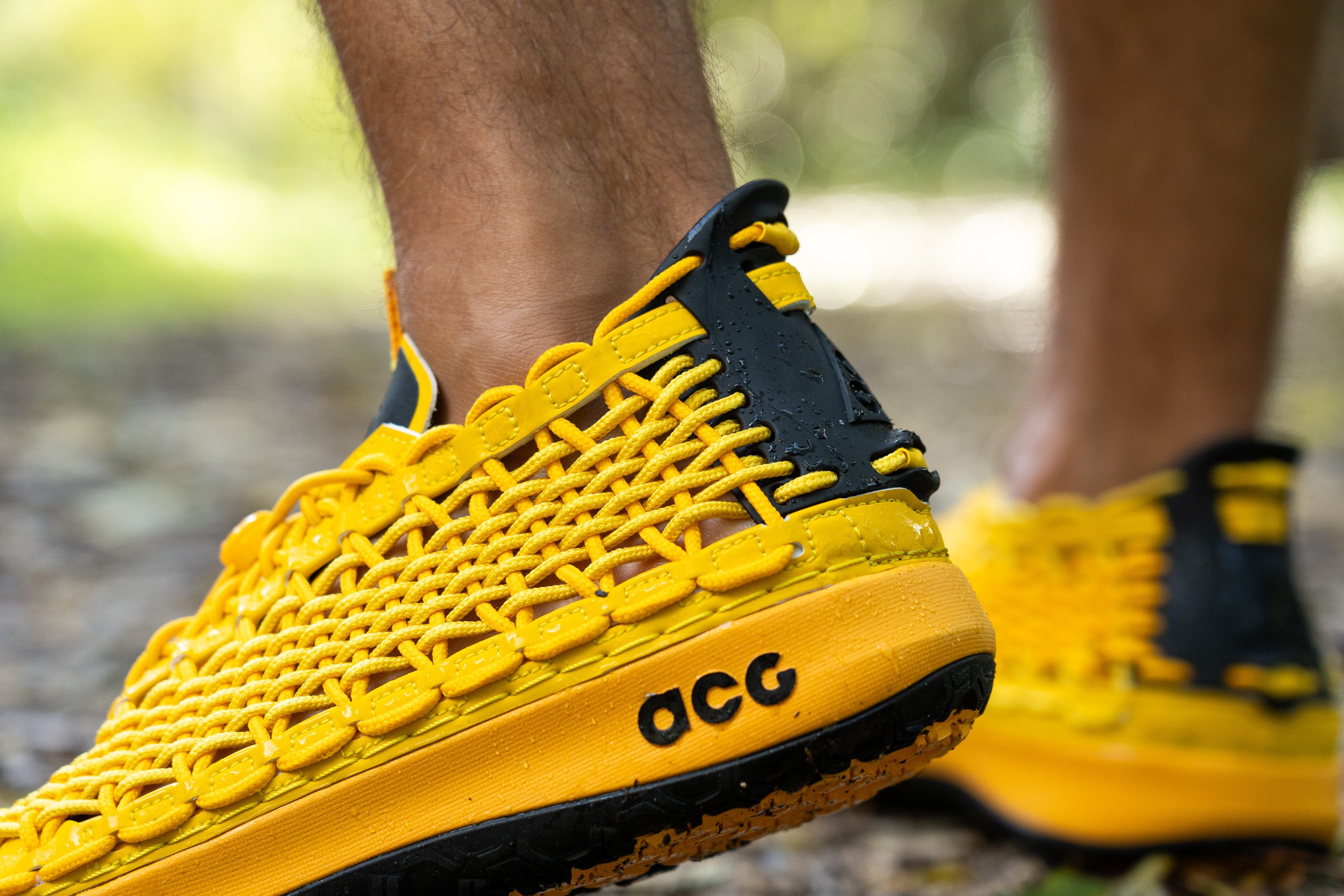
| ACG Watercat+ | Pull tab |

